#I will say that the menu can vary wildly
Explore tagged Tumblr posts
Text
currently accepting recommendations for what sort of specialty food is served at the Pines Family Kitchen in my Restaurant AU, where Stan opens up a restaurant
#they're gonna serve your classic American foods I think#a decent emphasis on breakfast#but there's gotta be a few things that are Unique#since Angie is the person that helps to make it successful I'd imagine there's some southern food there#and I feel like Stan would probably insist on the menu containing some New Jersey/Northeastern-y cuisine#.....I know NOTHING about food in New Jersey so if anyone else has expertise that would be appreciated#I have some understanding of southern food but idk what they do over in the Northeast#I will say that the menu can vary wildly#what they're serving depends upon what all they can get their hands on at the moment#Restaurant AU#speecher speaks
34 notes
·
View notes
Note
In your melco married au, I was wondering if ambessa would be inclined to meet melike purely out of a grandmothers desire, or if she doesn’t want anything to do with her if it means that Mel won’t return to Noxus either way? Hope you’re doing well ✨
She'd absolutely drop in - complete with manufactured excuses "My generals are interested in the medicinal Shimmer your husband is bankrolling," - "I had business in Greater Shurima and thought your Hexgates would cut the journey in half," - "My ships need refueling and Zaun's diesel is cheaper."
She'd 100% barge into Mel and Silco's estate and make herself right at home, because what are boundaries? What is permission? This is her daughter, and her daughter's daughter, and Ambessa is the fount from whence this greatness sprung. They should be thrilled she's taking time off from conquest and terror campaigns to darken their doorstep.
Each time, Mel ends up wildly stressed, Silco vaguely irritated, and their staff on tenterhooks because having a Noxian general as a houseguest comes with tons of demands: fresh meat for dinner, entertainment and lodgings for Ambessa's huge entourage, plenty of space for Ambessa's hounds to roam free and a whole private berch for her ships etc.
Not to mention Silco's network have to make sure they slip no spies into Zaunite territory.
Deep down, though, Ambessa does want to see how her granddaughter is progressing, and that she's picking up no nasty Trencher habits like self-determinism, backtalk and making friends with the hoi polloi.
She'll inflict Mel with a barrage of unsolicited advice, and criticize every aspect of Mel's softhearted approach to mothering:
"You let the infant sleep in yours and your husband's bed?"
"What, no wet-nurse? You'll ruin your figure."
"Why does she cry all the time? Is she ill?"
"She cannot speak yet? That's what you get for raising her around mongrels."
"She's so skinny. You aren't feeding her enough."
"Are you sure you didn't bed the valet? She looks nothing like her father."
Mel will grit her teeth and say as little as possible, and Silco will sit beside her with an expression of half-lidded neutrality while inside he considers a hundred creative ways to commit matricide-in-law.
(Jinx, in the rafters, has already retrofitted sludge-bombs to explode on impact the moment Ambessa's warship is at high sea. She'll be listening to the newsreel after Ambessa departs with the eagerness of a child anticipating fireworks.)
To Silco's credit, he's a skilled, if frosty, host, and Ambessa's ego is quite gratified by all the trouble that uppity Trencher is taking to impress her. (She doesn't realize that he's doing this to put Mel's mind at ease. The less ammunition Ambessa has re: Zaun's unsuitability as a "backwater", and the less barbs she has to sling re: Silco's suitability as a consort, the better. She also doesn't realize that it's Mel's impeccable tastes and ease with managing a city that's making her visit so pleasant: every amenity already anticipated, the servants respectful but not clingy, the wine cellar stocked with excellent vintages and a dinner menu that's as sophisticated as it is varied.)
In the evenings, he'll take Ambessa's entourage to the Deadlands to hunt Sump-boar, and Ambessa's guards will marvel that such an ugly, wretched place has so much hidden splendor, and Ambessa's officers will take in the eerie landscape and Silco's ease with navigating the tunnels and wonder if maybe the rumors about the Eye being a secret blood-sorcerer are true.
Ambessa will never say she's enjoying herself, but she will say she could've done worse for a son-in-law, that Silco has a sense of ruthless finesse and an ironclad understanding of fatherly duty, and that the baby is "coming along nicely, even if she's still too puny to handle a broadsword."
(She has no idea that by the time Melike's seven, he'll have taught her how to sever arteries six different ways with a butterfly knife.)
(She also has no clue Melike can, in fact, speak. She just doesn't speak in front of Ambessa. A blessing, given her favorite words are "Piss off!", "Boom!" and "Papa<3!")
(The girl will continue practicing selective mutism in front of the Medarda Matriarch until she's at least five years old).
On the whole, though, Ambessa tends to end these drop-ins the tiniest bit more favorably disposed toward her daughter's choice of husband. Not that she'd ever say it to either's face. Instead she'll drop pointed remarks to Mel, like "He's a clever enough businessman, but beware: he has no love for the Imperium, and you are Imperium through and through," or "He's a passable enough husband, but do not let that slippery tongue fool you: a shark's teeth stay hidden till it's too late," or "His city's an industrious one, but the darkness and fumes are bad for a woman's looks, and he is a man who fixates on beauty."
And she'll depart with a final, ominous, "You'd have been better off in Noxus. Your place is at the heart of the empire. He cannot give you that."
Then she'll roll out with her warships and her bloodthirsty entourage, leaving behind the faint whiff of blood and iron and the lingering sense that her presence has stirred the pot of Mel's marriage to Silco in ways none of them will enjoy.
Mel will spend the next week or two on edge, jittery and disgruntled, and Silco will start thinking about how he can fortify Zaun's borders against foreign invasion. They'll have an argument by the month's end over whether Silco's dreams of Zaun take precedence over their dreams for their family, and whether Mel secretly plans to betray him once his back is turned and abscond with Melike to the Motherland, and their household will be in disarray and the atmosphere will be fraught- until they realize, oh, they have the place all to themselves again.
Then it's off to bed, and mending whatever rift Ambessa's visit has torn between them with lots and lots of makeup sex and plenty of renewed vows of devotion in the afterglow.
Little Melike grows up watching the dance between her father and her mother and her grandmother, and decides, y'know, her folks have a relationship that hinges on compromise, even if they both veer towards extremes. Her grandmother, however, is an example of a woman who doesn't compromise, doesn't negotiate, doesn't budge: an icon, a figurehead, a titan.
A woman who has carved out her own path, and expects the same of her kin.
And Melike goes: y'know?
I think I'll be a titan, too.
And by twenty, she's taken control of the Shimmer trade routes. By twenty-five, she's got her own mercantile empire. By thirty, she's taken over a small province in Shurima and brought it under Zaun's jurisdiction as a client state, and she's done it, not with cutthroat business deals like Papa, or sly political maneuvering like Mama, but with sheer, uncompromising will and a ruthless streak that, once awakened, she never puts to sleep.
She goes on to be a charismatic, brilliant leader and an unstoppable force: ready to spread word of self-determination across the continents, and willing to take on any empire that stands in her way.
Ambessa's last days will be spent hearing about her granddaughter's meteoric rise, and thinking: shit.
The Medarda bloodline might actually last the distance.
And if Mel and Silco's union is what birthed this perfect storm of intellect and will, both Wolf and Fox wrapped in a mermaid's pretty fins, then well…
Maybe there's something to be said about strength in compromise, after all.
<3
#arcane#arcane league of legends#forward but never forget/xoxo#arcane silco#silco#asks#forward (never forget)/xoxo#arcane jinx#jinx#arcane mel#mel medarda#arcane ambessa#ambessa#ambessa medarda#silco x mel#melco#mal de mer
46 notes
·
View notes
Note
Applebee's. Chili's. Outback Steakhouse. Which is superior, which is inferior, and which would Michiru prefer to be caught dead in, if those were her only choices?
The Europeans, in those times so often called the Dark Ages, much to the frustration and woe of any given historian, had a number of different methods of execution, varying wildly in degrees of coarseness and sadism, but, no matter the method, one ends up dead all the same.
So it is with the above-mentioned brasseries of the middle class. Differing in method and style, but never wavering in the work of stuffing one with as much sodium and fat as one could possibly bear, protecting the innocent from the ghastly danger of encountering a food with which they are not familiar. It is the work of feeding toddlers who can drive and purchase alcohol, and they do succeed in this aim.
Nevertheless, it has been asked that I outline a difference between them, and I shall attempt to do so.
Applebee's. Well, if we are eating good in the neighborhood, I can only imagine what sort of neighborhood in which one dwells. I believe I saw such a place in some commercial posing as a documentary at a gala event. Children under tin roofs and such.
But for the purposes of my answer, Applebee's is a mere crucifixion. Hopelessly old, unimaginative and immutable, its meals and murder known even to little children. Is it unspeakably cruel? Of course. Agonizingly drawn out? The disinterested teenage server will ensure it? But is it in any way interesting? Is one compelled, or even reviled, by something horrifying which has become a part of the very fabric of culture? Regrettably, no.
However, to attend a Chili's is to be drawn and quartered--the English having no taste for subtlety, whatever they've managed to convince some American--it is as aggressive as it is vile, containing things such as the Nashville Hot Mozz, which is certainly a collection of syllables assembled into some order. Marg of the Month. Free chips and salsa. Passing for some sort of steerage class Mexican in much the same way London is aspirationally a European city. You are dead, or fed, in all the gore and hot red of it, and what it lacks in elegance it certainly makes up for in volume.
Outback Steakhouse, then, is to be broken on the wheel, the French having a sense of the poetic even in the moment of barbarism. One could almost believe it were a lovely thing. The ring of it, "no rules, just right." If one were a child or a fool, one could see how the folksy earthiness of a place asking nothing but a moment of your steak-based time could draw one in. It aspires only to be a steakhouse, in the outback.
Then, as one reads the cocktail menu and says, into the open air, "I will be having the Wallaby Darned," the crack of a bone snaps to meet it, more promising to follow, and then the sudden sadness of realizing that a cow was born, grew, and died to make such a thing possible. It is the Somme in bovine form.
One may question what Australia has quite done to deserve such an ignominious association, and if the next draft of war crimes might not include such a thing.
All things being true, I am almost certainly going to defer to my beloved. As love is a complicated thing, and one comes to love the flaws in one's partner as the worn bend in the stair, I would choose to have her select our dinner menu.
Among these, regrettably, there is a location serving a gingerbread cookie martini, and so, I shall be broken on the wheel, an onion blooming in the field where my palate once gamboled in the sun.
--M. Kaioh
25 notes
·
View notes
Text
after many, many, MANY hours, i have finally completed persona 5 royal and am now presenting my thoughts. overall i think i have to rate it a 4.5/10, with a note that rather than being generally mid, it swings so wildly between the good and the bad that it evens out just below average for me
spoilers for ALL of the game under the cut including 3rd semester
the good:
this game is STYLISH. that is probably the first thing everyone says about this game but it's true and it has to be said. everything from the hud to the settings menu is themed, it's slick and fun and just really well done
the music slaps. again, gets said a lot, but has to be acknowledged. so good
in theory the gameplay loop is fun. the swapping between dungeon crawling in the palaces and the daily social links is interesting, and for the first good 40 hours of the game or so i found it really addictive and well balanced (yes in spite of the tutorial)
the characters were (mostly) likeable and there were some good social link stories- notable mentions include futaba, sojiro and yoshida
i loved walking around tokyo, it felt very immersive. i used to travel to shibuya all the time for work and it was a lot of fun recognising the spots and even the way you walk out of the train station!
the bad:
IT'S TOO LONG. it's just too long. my save file is at 119 hours after completing the game. i spread this out over an irl year of playing the game. i was still so burnt out when i got to the end my main emotion was RELIEF. you could cut this game down to like half of this run time and it would only benefit it. there is so dialogue spent just repeating points you already know, or scenes that you have to play on a regular basis (eg me spamming through doing affinity readings or kawakami making coffee or WHATEVER), and it is not to the benefit of the game at all
the excessive length also makes other parts of the game that would otherwise be forgivable into absolute slogs. stuff like the combat being mostly way too easy (with the exception of random frustration spikes like okumura), or the fact that so many of the confidants follow the exact same pattern down to which rank you’re going to be asked to arbitrarily go to mementos to solve their problem- these would be much less annoying if i didnt have to do it SO MUCH AGAIN AND AGAIN
on that note oh my god mementos. i fucking hate mementos. most boring content in existence and when i found out they made more of it in the third semester i screamed out loud
ren/akira/joker as a self-insert main character did not work for me and that negatively impacted just about every character relationship with him for me (especially the romances) because it just felt like there was nothing for people to connect to. he’s just so… nothing, but at the same time wasn't enough of a blank slate for me to feel like i could fully project onto him as a self-insert
i think joker could have worked better for me if they either a) made him a more defined character (my preference), OR if they insist on sticking with a self-insert, make the dialogue options were varied. i don’t expect branching options but i do appreciate it when you at least pretend to give me some agency about the replies my character gives, it can mean a lot in a roleplaying game to actually feel like you're, yknow, roleplaying
i generally like the bombastic wild designs persona has for enemies and stuff but i really struggle to take some of the characters seriously when their masks look like this


IN PARTICULAR why is futaba's whole metaverse outfit so ugly. do my girl justice
akechi is a character who i feel will make for very compelling fanfiction but unfortunately i found his actual canon depiction underwhelming
the entire way they handled kawakami as a confidant and the fact you can choose her as a romance option. INSANELY uncomfortable and negates the point of her entire story arc about deciding to care about her students again and not get extorted anymore, but then you as the player character can date her, can continue to get her to do your manual labour for you and give you massages, which you're heavily incentivised to do because it's so useful as a gameplay mechanic. it is SO UNCOMFORTABLE
maybe i'll make a separate post breaking down my thoughts about each confidant because i have other issues with other peoples arcs but kawakami was the most egregious. as if people havent heard me rant enough already
in general that thing of the game undermining its own messages for the sake of either very bad comedy or fanservice is a reoccuring issue. unfortunately very anime in that sense. as well as kawakami: - you spend the entire first dungeon of the game talking about how shitty this perverted teacher is for his treatment of ann and trying to assault her and then i have to spend the rest of the game sitting through MULTIPLE fanservice jokes about ann (this underage girl btw) being really Hot and Sexy and forcing her to strip for yusuke - ryuji risked his life to save the others and then the girls... beat him up for it? it was clearly meant for comedy, but god did it land flat - the game proves over and over again that the police and justice system is corrupt and ineffective but they never actually seem to... want to do anything about it? makoto literally says she's going to become a cop at the end of her confidant arc!!! girl!!!
their solution to the justice system being shit is to get people to confess to their crimes and Feel Bad, where the villains then proceed to.... be handled under the same justice system we have i guess? as though the issue here was just the fact that bad guys wouldn't confess, and we don't need to look at, hey, why do these people commit the crimes they do, how do we handle punishment vs rehabilitation, etc.
it's weird because they do sort of dance around this topic sometimes (like with akechi's fucked up upbringing) but it always feels like they're scared of diving too deep into it. i don't expect a full marxist re-examining of society from highschoolers but idk man, for SUCH a long game i feel like it was a weirdly shallow reading of the societal issues around authority and crime
also: why does the 'rebel against social norms!' game still not let me romance same-gender confidants. let me date ryuji you cowards
#eloise talks#eloise plays persona 5#of course it is very important to remember#if you like this game? all of my critique IS actually also an attack on you personally. yes you. 🫵#/s
9 notes
·
View notes
Text
The Proliferation and Problem of the ✨ Sparkles ✨ Icon
New Post has been published on https://thedigitalinsider.com/the-proliferation-and-problem-of-the-sparkles-icon/
The Proliferation and Problem of the ✨ Sparkles ✨ Icon
Kate Kaplan hits on something over at Nielsen Norman Group’s blog that’s been bugging me:
The challenge with this icon is sparkle ambiguity: Participants in our recent research study generally agreed that it represented something a little special. But, what was that something? And why was it special? That was less obvious. We encountered widely and wildly varied interpretations.
Man, I hate those sparkles. Correction: I loathe it as an icon but I use the heck out the ✨ emoji. I may even go so far as to say that my favorite thing about Dave Rupert’s introduction to web components is that it is littered with ✨ emoji every time the word “superpower” is evoked.
(Correction for the correction: I love everything about Dave’s introduction to web components. Take the full course!)
Sparkles get closer to becoming the unofficial AI icon every time a new one makes its way into some new app’s UI — the same way some menus became hamburgers and others became kebabs.
It’s ambiguous, right? I will say that I was stoked to see Notion roll out a fresh new icon for their AI feature just this week:
A face is interesting! I find human heads less compelling, especially when they’re realistic. Same deal with robot heads, which is another theme you can spot in the wild. But a face, particularly one that’s on the whimsical side as a line drawing, looks like it could work in this context that’s specific to Notion. I imagine another company or app having a tough time pulling off the same icon because this one is so closely tied to Notion’s overall branding:
See how nice it is next to the rest of Notion’s icons?
I also like how Notion has several versions of the icon for use in different situations.
And, yes, it animates as well:
It’s the button that persists in the bottom-right corner.
I’m not saying Notion’s landed on a silver bullet. What I am saying is that they’re doing a great job transitioning from an ambiguous one to a more meaningful one, something that Kate articulates extremely well:
[S]parkles are used frequently to represent not only AI features and capabilities but also completely unrelated features and content, such as visual effects, deals or rewards, personalized ads, and new content.
I get worked up about this because I own a pessimistic and assumptive view that the proliferation of sparkles icons reeks of marketing. There’s no way for me to know this, of course, but I’ll unabashedly don my tinfoil hat for this one.
Anyway, Kate’s article is a much more thorough investigation that’s worth the deep dive — it’s a selection pulled from an entire book on the topic of successful icon design. I’ll leave you with a sobering quote:
Finally, I also predict that the icon’s association with AI-driven features will get stronger in the immediate future. So, for the time being, using it to indicate AI-driven features (or even simply new features) may be useful. Over time, as AI-driven features become more common or even expected across interfaces, there will be less of a need to call them out. It won’t matter that the features are AI-driven; it will matter only that they are present and meet user needs.
#ai#app#Article#Blog#book#Branding#challenge#content#course#deal#deals#Design#effects#emoji#Features#Full#Future#how#human#icons#it#LESS#links#Marketing#matter#Notion#One#personalized ads#Research#REST
3 notes
·
View notes
Note
I'm late, heck, but for the detailed headcanon asks: 6, 12, 22, 35, and 45? 👀
Thanks so much for asking!! Never too late, I'm always here to talk about the boy :3

6. Eating habits and sample daily menu
V doesn't have the best eating habits tbh. When he's stressed he barely gets anything down, and the stress working at Araska brought with it only made that worse. Since he's usually out and about all day really, "lunch" is usually just whatever and whenever, usually from a vending machine or street food, despite him not being fond of either as much. Honestly, I see him as the kind of guy who probably makes it through the day fueled by energy drinks. He'll try to have something small for breakfast at least, at least a protein bar of sorts, or cereal (dry even, just to eat *something*). Dinner though then at least is usually a "proper" meal, something warm, something filling, doesn't need to be fancy (although being able to go to fancy restaurants regularly is one of the things he actually misses most about not working at Arasaka anymore during his first few months as a new merc).
Sample daily menu:
Breakfast: Coffee (with milk and sugar) & protein bar/ cereal/ toast with eggs (when it's a slow day with spare time in the morning)/ french toast or waffles on days "off" when there's time to go eat out somewhere that serves either
Lunch: varies wildly, sometimes also just nothing when it's a "one gig/ appointment after the other" kind of day; whatever he manages to get down in all the stress, and sometimes that's just soda or energy drinks or coffee and the like
Dinner: pizza, ramen, something warm and filling, can be streetfood, but ideally something a bit more high quality and tasty/ if he can afford it he'll go eat sushi somewhere nice
12. Favorite book genre?
I have to say I don't see him as much of an avid reader. To wind down he's more a "play a game/ listen to music/ watch TV" kind of person. Most of the books he has revolve around tech, maybe some history and culture stuff from all around the world. So I guess nonfiction as a whole as favourite genre? xD Maybe with a handful of scifi novels and spy thrillers thrown in, but they're in the minority.
22. Given a blank piece of paper, a pencil, and nothing to do, what would happen?
Depending on how much time of nothing to do we're talking about here, he'd probably start planning out something interesting to do. An exciting vacation for example, a list of places he'd like to see and why, if we're talking a few hours at most. With more time (and post-Sun ending) he'd probably come up with a detailed plan on how to make the Afterlife run even more efficiently. He might request more than one piece of paper for this though.
35. What activities do they enjoy, but consider to be a waste of time?
Going shopping xD There is so many better ways to spend an afternoon, but in his mind it brings him back to simpler times, there's always new things to see, and, let's be honest, he just loves clothes a little too much.
45. Superstitions or views on the occult?
No views on the occult whatsoever. He indulges Misty with her tarot stuff because he likes her as a person and considers himself relatively open to new experiences. But it's probably as far as he'll ever venture down that path, and half of the time he's not quite sure what to make of anything Misty says. He's not a superstitious person, but he does believe in luck, and that sometimes it just plays a part in you ending up in the right place at the right time (or the wrong place at the wrong time, if you're unlucky).
4 notes
·
View notes
Text
Alright let's get into it. TW for weight loss, diet talk, calorie discussion, etc. (Note: I am somebody who is studying nutrition and who has studied nutrition, but I am not an RD, I do not have a degree in this subject, and I have not done research in the field; I have *read and discussed* a lot of research in the field in the context of nutrition classes, and I am also someone who has lost a significant amount of weight and participated in the NWCR long-term study as a subject and I am someone who was forced to go to weight watchers as a kid AND I am somebody who is fat AND I am somebody who is a fat acceptance advocate and a supporter of HAES informed care)
In some ways, everybody in this thread is correct.
People who work in and do research in nutrition do not generally say "CICO is a myth." (Even in the links cited from the maintenance phase episode, Kevin Hall's research points to a model that needs to be adapted but is still based on the general premise that an energy gap will lead to weight loss but how that gap is maintained is changed throughout the process.)
To an extent, @max1461 is right; if you put fewer calories into your body than it consumes, your body will burn calories from your fat reserves (AND your muscle) and you will lose weight.
HOWEVER, there is a big "but" that comes with that, because it is exceptionally hard to figure out how many calories you're putting into your body, and how many calories your body is burning, and these numbers are tremendously variable from person to person and sometimes from day to day, and from food to food.
If you buy two Baby Ruth bars and test them for calories you may find that they vary by a significant amount from what is listed on the package. If you weigh 100g of carrots into two bowls, one in the summer and one in the winter, it's very likely that you're going to get one bowl that has fewer calories than the other based on the sugar content of the carrots. If you get a hamburger with the calories listed on the menu, it could be leaner and lower calorie than what is on the menu or you could have gotten the patty where there happened to be a bit more fat out of all the rest and your hamburger has a lot more calories than what's on the menu. *EVEN IF* you are weighing and measuring everything you eat, you are going to get a pretty significant amount of variation in the calories in the food.
Your body is also going to absorb different amounts of food; Max noted that TDEE calculators give an average of what people can expect to be burning a day but that "average" is wildly variable based on your body, how much exercise you're doing, how hydrated you are, and a million things from your menstrual cycle to your mood that can impact how efficient your digestion is.
CICO is not a myth, but CICO is Much, Much, Much harder to accurately calculate than most people (including most doctors) think it is.
@tanadrin is correct that there's good evidence that your body has a "set point" that it wants to stick to and will correct for AND that set-point theory often gets reduced to "CICO is a myth," which is unfortunate because that's a massive oversimplification, AND that "CICO is a myth" is a reaction to things like weight loss trainers saying things like "Weight loss is easy. It's as simple as calories in, calories out." It's not that simple, and it's not just a matter of "willpower." If you cut your calories, your body starts fucking with the hormones that make you feel hunger and satiety. Your body makes you feel hungrier when you are regularly cutting calories than you would feel otherwise, and that feeling of being hungrier (and a reduced metabolic rate) may stick around for a long time after a weight loss and making it physically difficult to continue eating the reduced calories your body needs to maintain a weight loss. The calorie reduction you used to have a 1-lb a week weight loss at month one of a diet will likely need to reduce SIGNIFICANTLY to maintain that weight loss at month 54 of a diet. If you go with pure CICO you'd think that a 500 calorie a day deficit would mean a pound of loss a week and maybe when you get to your goal weight you can calculate your new TDEE at your lower weight to maintain, but actually you might need to run at a deficit of 200 calories below what "should" be the new TDEE to maintain; that metabolic adaptation may reduce over an extended period of time but it's a big part of why you see weight regain after dieting (again, see Kevin Hall's research). You literally feel hungrier and your body is burning fewer calories after a diet than it was at the start of a diet. That's why it's difficult to maintain weight loss over time, that's why it's not as simple as CICO.
However all of that is ALSO variable; some people don't have as significant a metabolic adaptation, some people end up with a reduced RMR but it doesn't impact their ability to maintain a loss, some people have VERY long term changes to their appetite and their ghrelin and leptin response. (Here is a *tiny* study of 14 people from the Biggest Loser and the long-term outcomes of their time on the show; it answers some interesting questions but it isn't definitive proof that reduced RMR after weight loss means it's impossible to maintain a loss, but it does have some compelling data about how CICO isn't as simple as putting in 100 calories and burning 100 calories when you may not be burning 100 calories)
@queeranarchism is correct in that there is no proven intervention with the exception of bariatric surgery (which people should not be pressured into and which has really significant side effects) that will make a fat person thin long-term. "Be skinny" is not something that doctors should be prescribing but many of them *do* and it's fucked up.
And this is where I think a lot of these conversations get really messy.
@max1461, if you want to diet to get the body you want, how successful you are is going to depend a lot on the body you started with and the body you want.
Some of the best research we have on long-term maintenance of weight loss comes from the Look AHEAD study and shows an 8.5% weight loss in the first year with a regain for a total of 4.7% weight loss at eight years to be a successful loss and maintenance for the high-intervention cohort of the weight loss study. High-intervention in this case means 6 months of weekly support meetings or individual counseling, a medically supervised VLCD, and the recommendation to replace two meals a day with shakes or snack bars provided by the study.
I'm going to use myself for math on this. I'm 240 pounds and five foot six. If I matched the model in this study, an 8.5% loss for me would mean a loss of 20.4 pounds. I would have a BMI of 35.4 - now, granted, everyone in this thread knows that BMI is bullshit, but an 8.5% weight loss would still leave me "obese." After 8 years, I'd be up to about 229, putting me at a BMI of 37.
When 100 doctors were surveyed about what kind of weight loss they'd recommend for obese patients, they said that 21% would be "acceptable" and 10% would be disappointing. When 60 obese patients were asked about what their goal weight from a weight loss regimen would be, the averaged answer was 32% weight loss.
Six months of a recommended diet of under 1800 calories a day netted an 8.5% loss for the Look AHEAD patients.
A different long-term study that looked at patients who were given 12 weeks of access to weight watchers found an average 2kg loss at five years.
So. What's my takeaway from this?
It is possible for many people in to lose *MODEST* amounts of weight (in the 2-5% range) with relatively minimal intervention and lifestyle change, and to lose more significant amounts of weight (~10%) with significant intervention.
It is possible for many people to maintain modest losses (regaining about half of the initial loss over about 5 years) over time
Doctors are not prescribing modest losses, and patients are not aiming for modest losses when they diet. (For instance, participation in the National Weight Control Registry study requires a loss of 30lbs and maintaining that loss for over a year)
I think that we're kind of talking about different things here. My doctor isn't going to be happy with me *only* losing ten pounds - he wants me to lose "fifty pounds, minimum," (a bit over 20%, so just about what that survey of doctors showed) but a 5% weight loss confers tremendous benefits in terms of heart disease and diabetes risk and outcomes. One of the major problems with weight loss as an industry and a medical goal (and the one that is central to Maintenance Phase) is that doctors and diets don't focus on health improvements, they focus on turning fat people into skinny people via dieting, which is *not* the kind of intervention there's good evidence for.
AND, ON TOP OF ALL OF THAT, I do think that it's possible for many people to significantly change their weight and body composition but doing so is not a minor intervention or even a major intervention, it is the kind of thing that becomes totally central to your life. Going from being fat to being thin (when it is even possible) requires an effort on par with becoming a competitive bodybuilder. You *can* become a competitive bodybuilder, but until you've tried to become a competitive bodybuilder you probably don't realize how much work it is and how disruptive to your life it is.
One of the complaints that Aubrey makes on Maintenance Phase that I agree with very strongly is that a lot of "just put your mind to it and lose the weight" sentiment comes from people who are relatively small and whose goals are relatively small and who, if they have been fat, have not spent a long time being fat. There are the occasional examples of people who lose hundreds of pounds and maintain that loss, and those people are extremely unusual and are showing an unusual amount of interest and focus on weight loss. Often those people walk for four hours a day, or eat under 1500 calories a day for years. They may give up other hobbies or end relationships in order to maintain that kind of weight loss. That is the kind of loss that *may* be possible for a great number of people but it is also the kind of weight loss that you have to be really realistic about if you want to attempt it. You're going to live at the gym. You're going to feel hungry, possibly all, of the time for years. You may be able to do it, but expect it to take a minimum of 2 hours a day of effort (and quite likely more, not including cooking time), and think about what you would have to cut out of your life in order to get two hours a day to put toward this.
And hearing "oh, it took me years to get the baby weight off, but I did it" from someone who took two years to lose twenty pounds and went back to a low pre-pregnancy weight by cutting out desserts is *maddening* when it's aimed at someone who has been fat since childhood and has been prescribed weight loss medications and been on diets and is told over and over again to lose 100 pounds.
Max, I'm not saying that's your situation or the bodyrecomp you went through, but there's an enormous difference between a normal-weight person trying to lose ten pounds and a fat person trying to lose a third of their body weight, and the regain on both of those is going to look really different.
This is further complicated by the fact that fat people are often told to lose weight FAST and are put on diets that are far below their BMR, let alone their TDEE, which is in a totally different universe than attempting to lose a couple of pounds in a year.
AND ASIDE FROM ALL OF THAT are the considerations for *why* someone's "ideal weight" might be their "ideal weight" - do they want to lose weight because the will feel better, because they want to look a certain way, or because they think they'll be subject to less stigma if they're thin? Do they want to look a certain way because they want to look a certain way, or because they believe that's the only way they'll be attractive to potential partners? Unpacking weight stigma while discussing that it is *often possible* to lose significant amounts of weight but it is *always unreasonable* to demand that people lose weight is complicated.
Also nutritional science is not pure bullshit it is a relatively young science that is complicated to study and research into nutrition is often funded by groups that have highly suspect motivations. I hate the "nutrition science is bullshit" take because let's be real people who say that almost never say "sociology is bullshit" in spite of sociological research having a lot of the same problems in terms of replication and questionable foundations. They don't just take the pure number of joules recorded by a bomb calorimeter and treat the human digestive system like it's a fucking woodburning stove the conversion factors for total energy and net energy for human food consumption started being developed in the 1890s and have been a source of concern for nutrition scientists since here's a UN Food and Agriculture report from 2004 that the discusses the limitations of different factor calculations like nutrition scientists obviously don't think that you're going to burn calories in the same way as a fucking bomb calorimeter I fucking hate that argument


It's like complaining that physics is invalid because all that math takes place in a vacuum *as though there aren't a whole shitload of ways to account for the friction of an environment when discussing physics*
Just found out that the dietary calorie is still measured by burning food in a "bomb calorimeter" and then measuring the heat produced. There's no solid evidence that this method is at all equivalent to how our bodies process food (an entirely different chemical process from combustion), the accuracy of this system has been disputed for as long as it's existed, and there are no available alternatives
There are 4800 calories in a kilogram of dry sawdust even though wood is completely indigestible to humans, because calories don't measure nutritional value, just how well something burns
Nutritional "science" is pure bullshit
45K notes
·
View notes
Text
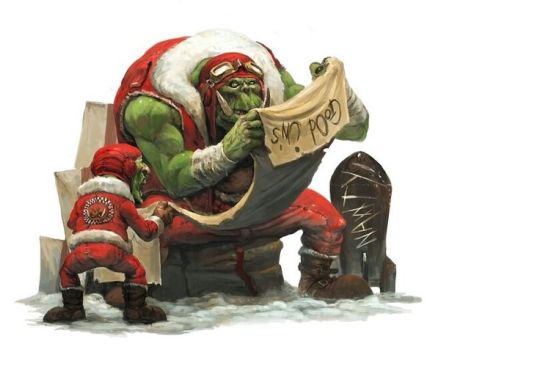
Only one week for sign up!!!
Like always, sign up are here!!
We are delighted to see all the wonderful request that everyone has made so far!! In the hope to help to help you along, and because this might be your first secret Santa Sanguinala exchange, I decided to provide a lil tutorial to help out!!! You have to make a minimum of 3 request, but we encourage you to make up to 10! The more request you have, the easier it will be for the person that got you!!
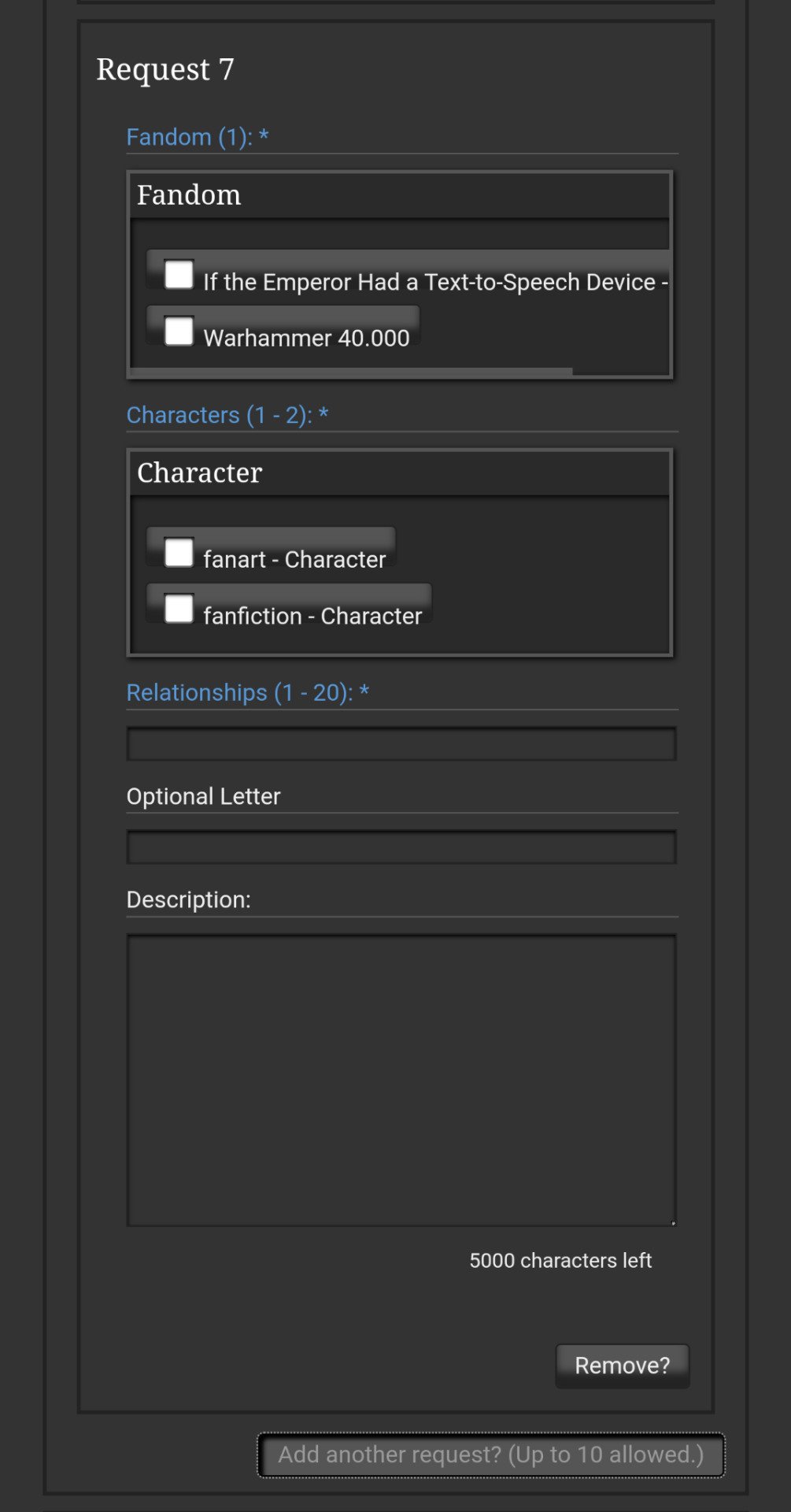
Fandom:
This is where you put the fandom! Please only select one.
Characters:
This is where you put the type of exchange gifts you want!! Fanart or fanfic- your choice!!
Relationships:
This is where the REAL fun begin! You can add up to 20 pairing from the nominated list! You will also find singular name, or duo written like "Such & Such", both denoting of a platonic relationship if that is what you prefer! To go more quickly through the terrifying drop down menu, type the first few letter of your fav characters, all the options with them will appear!!
Optional Letter:
Are you very wordy? Do you have complex feelings for every ships you suggested?? Was the suggestion box too small??? If that's the case, you can put here the link to a google doc with all your complex feelings, ideas, DNW, hopes and dreams.... Don't forget to enable the "visible by everyone with the link" mode!
Description:
The actual meat of the request! Feel free to be as detailed, or as simple as you want! It can go from "Idk I just wanna see them happy!" To a literal essay on how you prefer their dynamic. To help you put, here are a few pointers:
Say the ratting you are looking for! Are you ok or not with NSFW?
Kinks? Don't be shy! Share them with us, tell us what make your heart flutter!
DNW are a necessity! Always include things that you REALLY don't want to read!!
While au are fine, please be general in you request. "Primarch maid cafe" is fine, describing all the events you want to see in it is not.
OC are fine, but do not go demanding people to write your own oc!! What you can do instead is basically ask "I want to see two Sororitas fall in love!" Don't start describing character's eyes color!
Be varied!! It's totally ok to have wildly different ship in one ask and just have a line or two about each!
You can always go read other people requests, to give you ideas! Or ask the mods for help!!
All in all, I hope this little guide was useful to everyone! So go get those request in!! And like always...
Happy Holiday!
#warhammer#wh40k#secret santa#warhammer 40k#warhammer community#warhammer fanart#warhammer fanfic#secret sanguinala
16 notes
·
View notes
Text
The Genesis Project Sburb game is very fun to play, but once you get to the Medium I have no idea what to do other than dungeon crawl and get Zillyhoo weapons (which I think is kinda early to receive in the game??) there’s no official guide on how to get to either the 2nd or 3rd ring so I’m a little lost.
Overall opinion on the game:
Cons:
Very buggy multiplayer. User’s ping level varies wildly which can result in booting a player out, thus changing who is a client and server player to each other.
This can also break your multiplayer session, making the Server player be unable to place required objects down onto the Client’s property.
Pesterchum chat log is pretty broken. To the point that it’s fairly painful to navigate + you have to open the chat log manually each time you want to have a private chat, and will randomly pop up on the screen whenever someone messages you.
Abilities menu is a little hard to understand/use. With some descriptions being abbreviated with no explanation as to what the abbreviations are referring to. (Example: AP = Attack Points.)
The land you spawn into in the Medium may or may not crash the game. Common problems I’ve discovered when this occurs.
No imps spawn in, making your planet behave like a Null session.
Planet does not appear on Skaia’s Map, resulting in a Void/Null session. (Teammate said it was like they’d spawned into a black void and was stuck. So I’m basing my review off of that as I couldn’t even visit his planet.)
Planet you spawn into may randomly decide to change it’s attributes. (Such as one time I played a solo game as a space player in the Land of Frost and Frogs, and upon reloading/spawning in the game decided I now live on the Land of Quartz and Cogs. Basically a Time player’s domain.)
Falling off the cliff at the edge of your property may cause your character in the multiplayer session to soft-lock when they respawn and be unable to interact with any objects (including doors).
Have no idea if there’s more than one denizen type, but all I ever get are green crocodiles that repeatedly mock me and say ‘Meat is the Best! Not that you’d know cuz ur a human’.
Map makes you have to ‘click and drag’ it to figure out where your player is located. This can be very finicky to make it move to where you want it to go, and sometimes tends to snap back to its prior position if it doesn’t like how you moved it.
Aggravating sprite character may float in front of your cursor during a battle or when trying to pick up an item and WONT MOVE, making you accidentally click on them and start a dialogue when you’re trying to avoid death.
No clear cut instructions for alchemizing. Some items may have an elemental typing which could either hinder or benefit you, but you will have no idea until you spend grist making it, thus wasting valuable time and resources via trial and error. (Remember kids; never play with fire. Your clothes will burn you. But a hot knife will cut through your enemies. - Tony the Tiger, probably.)
You can accidentally kill denizens when clicking if the chat button doesn’t appear and you’re within their hit box range.
No eject strife specibus feature. You’re stuck with whatever four different objects you selected for combat.
Can’t see your character behind walls or the house when outside. Sometimes rotating the camera fixes this, but if you’ve built a wall in front of another wall you might as well give up on even trying to figure out how to find where your character is at.
You can soft-lock your game if you put the Sburb cd inside a laptop and accidentally build a wall in between it and your character and then exit out of building mode. (Then you have to implement building cheats to create a work around).
Pros:
It’s a Homestuck game that acts like an actual game session. (Bugs are to be expected, even in a canon session of Sburb)
Class and Aspects have a nice diverse range, and you can either customize or have the game decide what your role should be.
Plenty of alchemizable options.
As far as my own alchemizing goes, I have yet to find a limit to the number of times you can upgrade your equipment. (Just some items don’t play nice with others. Focus on weapons and clothing upgrades, the rest is just decor and doesn’t need to be upgraded.)
Leveling system works pretty nice.
I enjoy the customizable character options.
Sometimes the game glitches are rather humorous. (One time the items I deployed for my Client glitched out and ended up fused together, and I apologized but the dude was like ‘F IT THATS GOOD ENOUGH. Lmao and he just went about his day).
The sheer inexperience of everyone trying to figure out how to play this game is epic when you have people spamming the chat log for help while others are going ‘I THOUGHT YOU’VE READ HOMESTUCK THREE TIMES ALREADY! WHAT DO YOU MEAN YOU DONT KNOW HOW TO ENTER THE MEDIUM!?’
The music is nice (when it doesn’t glitch and cut out ^w^’)
I am very happy they have a solo player version of the game to play. It runs very smoothly.
The dungeons are actually fairly creative and fun. (Would like to be able to get more than four item slots though, but making use of the strife specibi to hold some items is nice)
Trash can in your home has INFINITE SPACE. Meaning you can throw away anything, but you must be careful hovering over it because you cannot retrieve the item once you discard it.
Overall still a fun game to play despite the bugs 👍
21 notes
·
View notes
Text
So! The Stardew Mod Idea Post. Actualization and accuracy of said actualizations to this list my vary wildly!
I gave them all their own little titles in my notes and just kept it that way. Dumping the contents of that app onto this blog is fun I should do it more.... now it’s officially is a spam account. Dear god I hope the readmore works.
-- Part 1 (The mods that aren’t npcs) --
“HV Style Special Gifts” is a bit of a friendship overhaul. While playing FOMT I really liked how their gift system handled cooking -- in both FOMT and SDV, cooking a dish requires you to upgrade your house and gather all of the required ingredients, which takes loads of effort depending on the recipe. IMO cooking is the weakest “activity” in SDV, and giving homemade food items the same weight as FOMT gives them would actually make me wanna cook more.
So: Most cooked dishes and the prismatic shard are now classified as “Special” gifts for the NPCs who love them, and now they give +120 friendship points and get a unique response ala FOMT’s special gifts.
//CAN you edit how friendship values work..? I sure hope so if not I wrote all this for nothing sndnmlalskdoaksk
There is an optional Part Two to this mod, where certain rare items can be forged into special gifts for marriage/roomie candidates (also ala FOMT, because I also liked making jewlery). To craft each, you’ll need the listed item/s, 3 refined quartz, and enough money to commission Clint to make them (for 3000 - 5000g? Price undecided.) They’re meant to be hard to make, to prevent a year 1 player from being able to make one every two days or something. For Late-game players that’s probably possible, though… they’d selll for a good profit, at least 1000g more than the commission price. Jewlery for “Magical” npcs require /another/ ingredient because if you’re trying to marry a god damn wizard you’re gonna Work for it buddy boy
List of Da Jewelry:
Crunchy Choker: (Abigail) Amethyst
Rainy Bangle: (Sebastian) 3 Frozen Tears
Tiger Hoop: (Sam) Tigerseye
Summer Brooch: (Penny) Emerald
Aqua Bellychain: (Emily) Aquamarine
Infused Watch: (Maru) 3 iridium ore
Princess Tiara (Haley) Diamond
Earth Anklet: (Leah) Jade
Fancy Eyeleash: (Harvey) Opal
Shiny Studs: (Alex) Topaz
Dark Bolo-Tie: (Shane) Netherite
Sea Pendant: (Elliot) Pearl
Vorpal Bauble: (Krobus) Helvite + Rare Disk //How does he wear it? Idk It’s just a little doohickey. maybe he smokes it like a cigar for all we know. If the farmer tried that they’d scream and die!
[For SVE NPCS]:
Queenly Chatelaine: (Olivia) 12 Gold ore //Chatelaines are so fucking cool man
Fairy Necklace: (Sophia) Fairy Stone
Princely Cufflinks: (Victor) Lunarite
Mermaid Clip: (Claire) Ocean Stone
Thunder Nail: (Wizard) Thunder Egg + Void essence //It’s one of those armor pieces you wear on your fingers to give you claws!!
[For My NPC (and NPC edit)]:
Merry Bell: (Ensley) Pyrite + Ancient Seed (the artifact) //Bell for his hat :) Would come packaged with “Ensley” as an optional file.
Meteor Horns: (Dwarf) Star Shards + Dragon Tooth //Embellishments for their helmet >:) Also sold separately with the “Other One” mod
I’d say their portraits would change once you give them a jewelry item but I use custom seasonal portraits and I’m not gonna get into THAT mess lmaoo….. maybe I’ll make edits for Dwarf specifically if Other One is also installed. You’ll pry my favoritism from my cold dead fingers and I’ll sit up from my grave to snatch it back
-- --
“Kitchen Minigames” is another “improvement” to cooking to make it more fun (to me.) Mining, fishing, combat, etc. have you doing something active and that makes it engaging, and while there’s no vanilla “cooking skill,” there’s enough recipes in the game to justify one. But when you cook in vanilla, it’s just… >click menu item. The mod would add a minigame a few seconds long when you cook something, with variations for pouring a drink and baking a pastry.
It would be pretty simple, just asking you to press/hold WASD at certain times (my concept for the pouring one would just have you hold w for 3 seconds), and if you fail one you’d just have to try again without losing any items. And if you’re, say, using Love Of Cooking to create multiple dishes at once, you would only have to win it once to cook all of them. My DREAM would be to add totally unique minigames for certain dishes — like dropping the toppings on a pizza, stirring a pot of pumpkin soup, cutting up a melon for the fruit salad… Stardew Valley Cooking Mama edition. Cooking Valley. Stardew M
//Honest I have no god damn idea how I’d make this beyond the food assets. With the others there are places I can start, but I don’t know if [add minigame] is actually possible with the current modding tools the community has..? Or even the ones my COMPUTER has. I’m using a Mac for this shit!! NOTHING works on Mac!!! It’s fun to imagine, though, which is the point of this post.
-- --
This one goes out to the players who like immersion: “Under The Weather” would add two styles of three new clothing items to the game: A raincoat, rainhat and rainboots, which can be bought from Willy or Pierre for 200g each, and a medicine item which can be bought from Harvey for 500g each (universal neutral gift).
From then on, if the player stands in rain for over 6 hours straight without wearing a raincoat, they start the next day with the Unwell debuff. Being unwell makes all tool actions take twice the energy, and in my perfect dream world make the player have a custom sneeze animation when they wake up, alongside a prompt that goes something like “My nose is stuffed up… I should’ve worn a raincoat yesterday.” The debuff lasts multiple in-game days unless you take the medicine, and you’ll get a big chunk of energy back. It would also be configurable which clothing piece would prevent the debuff, if you just REALLY wanna wear a certain shirt outside.
-- Part 2 (The mods that are npcs) --
“The Other One” is 100% specially made for indulgent reasons, idk if I’ll even release this one to the public if I finish this on my own..! It’s just not fair that we only get one nonhuman relationship option, sooo! Give the dwarf a star pendant and ask them to move in with you. That’s the Mod. It 1.4’s the bomb dispenser.
In the days since I came up with this I wrote way way more, here’s the details:
The quarry map would be edited to have two glowing eyes behind that opening next to the reaper statue — whoever’s in there would offer to sell you a star pendant for... 50 cave carrots? 100 solar essence? Either of those would work. The Roomie Experience would be pretty much like Krobus’s deal - except they’ll come out on summer nights, to work on their spaceship. Dwarf’s enamored by your TV, and thinks your animals are kind of disturbing (especially the horse), and they hang out in your cellar a lot, and they give you bombs... They also steal from you, maybe? Not in any tangible “lose an item” way, but they can and will just take your shit. Their fourteen-heart event would be them powering up their spaceship for the first time..!?
Once in a while, they’ll give you a lava crumble, like how krobus would cook a strange bun (I like how even the nonhumans cook for u...) They might also give you a miner’s treat. The crumble gives you +80 energy, +30 health, +2 mining and +2 defense, because really, what else would it do. However, only the farmer and the Dwarf have the fortitude to wolf down this whole thing, so everyone else will dislike it… except for Abigail, who’s neutral towards it. The recipe to make one yourself would be: Sugar, Solar essence, Fire Quartz. You’d probably get the recipe from the volcano shop.
I know Krobus doesn’t have any heart events besides their fourteenth, buuut… I think the Dwarf should have a couple. As a treat. If you’ve got the polyam mod installed and have Krobus /and/ Dwarf move in with you, that should get you a special event, too… it would be so funny look imagine…
Instead of refusing to speak to you if you kick them out, they’ll just tell you to fuck off..? Their spouse room would look pretty wild. Who put all these god damn rocks in my house. Is that a sword
The .. “vibe” of the spouse dialogue would be configurable, possibly, if one wants to stick to the “roommates are platonic” thing. Not me though, God grew me in a vat especially to make sure that this would be the outcome of my life up to this point and my feelings about this little motherfucker can’t ever be changed. Liking characters with shadowed faces and glowing dot eyes is in my Very Bones, you see
-- --
“Hatmouse” is the shortest “custom npc” entry here. It makes the hatmouse much more of a person you can interact with. I like the little guy and I wanna be friends with ‘em and there’s at least 1 person on the Stardew subreddit who agrees with me, so……. There’d be 3 heart events for them, at levels 2, 4, and 8, there’d be a couple more letters they send you, and they would!! Talk to You!! When you buy from them!! Their gift tastes are still a bit of a mystery to me. They’d love cheese, sunflower seeds and cloth, at least. Maybe that’s all I really need to list for ‘em…
Portraits are a must, too; if I don’t get to see the rat giving me a thumbs up when I get a new achievement then what’s the fucking POINT of it all!!!!
Finally, their relationships would just be [Bear: Enemy] and you wouldn’t get any context for it.
-- --
Ok it’s time for me to talk about Ensley hoo boy. oh no. alright
“Ensley” is exactly what it says; it adds Ensley to the game and you can marry him if that is a thing you’d want to do for some reason! I love “secret” and “tedious/weird to unlock” characters in dating/life sims that you can’t meet right away, or maybe ever.. the harvest goddess and kappa in harvest moon, the stalker girl with the hoop hair in tokimeki memorial… and Ensley is That but for This One.
He’s a little elf or somethin’ who lives in the secret woods, and to meet him you’ll have to:
Have not married anyone until Winter of year 2
Have two hearts or more with most npcs (the 12 marriage candidates and also Gus, shoutout to Gus)
Not sold out to Joja yet
Done the Old Man Cannoli quest
Donated the ancient sword, elvish jewelry, and ancient seed to the museum
Realize that there is now a tiny passage in the far right of the map the next time you visit the secret woods.
THEN knock on the little door you find and voila!
Ensley is technically not supposed to be there — long ago the elves all left to another plane for [undisclosed reasons] but he missed the memo and got left behind. While being able to do magic, he isn’t powerful or knowledgable enough to open up a portal to get to where he’s supposed to be on his own.
Elf magic is a forgotten art, taken with them when they left, and so closely gatekept that not even the oldest human wizard around would even know the beginner stuff... So he’s just been kinda,,, hanging out for however long it’s been, always a little bit anxious and uncomfortable and collecting trinkets, watching humans and having parties with himself as a distraction…. Practicing what he’d say if a puny human solved his puzzle and tried barging into his home to steal all his Possessions... Clumsily trying to keep up the image of “aloof high-and-mighty Noble Elf who knows EXACTLY what he’s doing.”
As you raise his heart level he slowly finds out that there’s a rift that hasn’t completely closed even after all this time, But..! If you made the right dialogue choices, he might decide that he’d rather stay in the human world with someone who likes him for who he is, than go back to pretending to be someone else in the elf kingdom, where nobody really treated him like an equal anyway. When he’s not fronting as a fantasy trope at the very beginning, he’s like… hm… like if the Muddler could Talk To The Trees and Critters and also had the alcohol tolerance of the hole in the ground, basically.
Will I be able to write him well enough to justify all the arbitrary rules I set up to unlock him!? I DONT know!! You get some elf lore and a couple new items, at the very least… perhaps even a new building and species of, say, mythical farm animal to inhabit it..? Topping up on ambitious features is my passion.
-- --
You’ve reached the end of the list! Thank you! If you read this far you probably have some kind of opinion on all of That, so uhh don’t be afraid to tell me if it’s bad! Or even if you like something! I am like an ant I’m 100x more nervous than you about this I can guarantee. I can PROMISE you
16 notes
·
View notes
Text
Take It (Over) Easy
Based on this ridiculous r/relationships post
For my beloved @deanismypatronass
“Not again, Dean.” It was too early for this nonsense and Sam tried to reason with him from the passenger seat. “There are a million places we could go for breakfast.”
Dean didn’t even take his eyes off the road. “Nope.”
Sam slumped against the seat. “Why? Why do we keep doing this?”
“You know why.”
Sam knew exactly why. The question was, did Dean?
For weeks now, Dean had been involved in a...Sam wasn’t even sure there was a word for it. Conflict? Standoff? Definitely not a battle of wits since Dean seemed to be using exactly zero of his. Whatever was happening between Dean and the cook at the diner, there was no doubt it was escalating.
It had never been a problem before. Cas was a great guy and an awesome cook and they’d frequented the place to the point of being regulars. That meant sometimes Cas would bring out their plates himself, stopping to chat for a few minutes when he did. Sam knew his brother better than he knew himself, and he’d watch Dean’s breakfast begin to cool while he talked with Cas, using his long lashes to every advantage as Cas stared with those intense blue eyes.
Sam was pretty sure there was more to it as well, even though he had no proof.
But then one day Dean had ordered his usual: two eggs over easy, bacon, hash browns, and rye toast. The server had brought out their food--nothing unusual there, the place was jammed--and Dean had glared at his plate.
“These are overcooked,” he announced. Sam looked up. The server started to reach for the plate again.
“I can take them back and have them redone,” she offered.
“No, it’s fine,” Dean said. “Just let the cook know.”
When she walked away, Sam looked at his brother. “Busy today.”
“Guess so.” Dean crammed a fork full of potatoes into his mouth, steadfastly ignoring his eggs.
Sam blinked at him. “I’m sure they can be remade.”
“Nope,” Dean said, aggressively biting a strip of bacon.
It had been over a month since that day and still Dean insisted they come back. Every time he ordered the same breakfast: two eggs over easy, bacon, hash browns, and rye toast. Every time his plate would come out exactly as he requested. Except for the eggs. Week one they were scrambled. Week two was an omelette. Week three the server nervously came out trying to keep two hard boiled eggs from rolling off the plate.
The entire diner seemed to hold its collective breath each time Dean entered, the bell on the door merrily chiming in direct opposition to the tension that filled the space. Cas stared impassively from the kitchen as Dean walked to their table, chin up in defiance. He ordered and then the wait began. Each week Dean glared at his plate, but refused to send it back, nothing changing until two weeks ago when he’d scrawled a note on the back of the bill as he paid it.
Then, last week, Cas had come out to deliver the plate himself.
“Your breakfast, sir,” he said with more sarcasm per syllable than Sam had ever heard.
Dean’s plate was dominated by six fried eggs, each cooked to varying stages of doneness. They were layered on top of the toast and potatoes and bacon. He set the plate down with a clatter. Dean took a deep breath and Sam knew he was counting to ten. He maybe got to six before turning to Cas. “You got something you want to say to me?”
Cas smiled. “Need some hot sauce?”
Dean tensed all over and made like he was going to get up, but Sam called his name and he stayed put. Cas calmly walked away.
Sam glanced over the menu without reading it, waiting to see what today would bring, idly wondering how hard it would be for Cas to acquire an ostrich egg. Through gritted teeth, Dean gave his usual order, and Sam could barely swallow his coffee as he waited. Dean sat like a statue, forearms leaning on the table as the minutes ticked away. When his plate arrived, it had all the components. Two eggs, four strips of bacon, hash browns and rye toast. The food was arranged on the perimeter of the plate, the bacon forming a diamond, inside of which Cas had cracked two raw eggs. The server set down the plate and nearly ran back to the safety of the counter.
“That’s it,” Dean said, with frightening stillness.
“Dean,” Sam said, but it was no use. He was on his feet striding toward the kitchen. Cas stormed out to meet him. The diner fell silent, all eyes on them. The two of them stood poised, every muscle tensed. Dean reached for Cas, who shoved his arm away, then shoved him with both hands. Dean staggered backwards, quickly regaining his balance and lunging toward Cas.
Becky, the tiny blonde manager, stepped between them. “Take it outside.”
Sam hurried to open the door, keeping his distance but making sure he could keep an eye on things. He watched as they argued, gesturing wildly at each other. He watched as Cas grabbed Dean by the shirt and pushed him up against the wall. Sam watched as Dean reached for Cas, both hands on his face as he pulled him in and kissed him.
Smiling, Sam went back to the table to finish his breakfast.
189 notes
·
View notes
Text
How to gif without photoshop
Hello! By popular demand (of like 4 people) I am going to write out a tutorial of how I make gifs when I’m on my personal laptop and don’t have access to photoshop. There is another method I use with a different software that is a bit more complicated and if people are interested, I will make a tutorial of that method as well. I’ll do my best to keep this concise, so let’s get started.
Warning that this is VERY text and image heavy because I know how frustrating it can be when a tutorial feels like it’s skipping steps and I want this to be as clear as possible. Also please read this on desktop, tumblr mobile kills the quality of gifs inside text posts.
This is the video I will be giffing and here is the gif I will be making!

What you need:
A video to gif
For the best results, I recommend a video that is either 720p or 1080p (basically the higher the quality, the better). Videos with good lighting and bright colors also turn out the best. Unfortunately for me, I gif the TV show Prodigal Son a lot and that show has neither of those things, which is why my gif example is from that show; if you can make a scene with zero lighting or vibrancy look even somewhat decent, you can make anything else look good.
A video downloader or screen recorder
This is the video downloader I use and this is the screen recorder but basically any youtube video download website or screen recorder program works. Keep in mind that ezgif has a pretty low upload limit for videos, so if you want to gif something longer than like ~4 minutes, cut the video down to the specific parts you want first on a website like this one.
ezgif
A very straight forward website that anyone can access. You don’t need to download anything, it’s all online.
Bonus: Online Image Editor (not required, but I use this website to add text to gifs)
1. Making the gif:
Once you have a video downloaded, you go to ezgif.com and go to the section video to gif. Click choose a file, scroll to your downloaded video, and hit upload video. Your screen should look like this now.
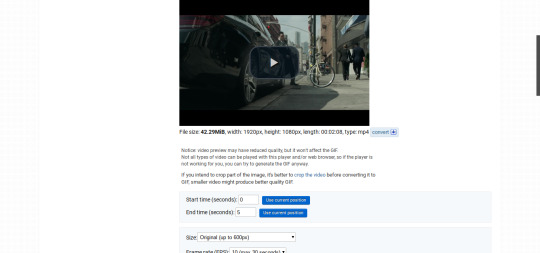
There are two ways to pull out the sections of the video you want to gif. You can either write in the start and end time in the little sections (you have to convert them to seconds: for example, if my gif started at 1:16 and ended at 1:20, it would be 76 seconds and 80 seconds respectively). Or you can do the method that I feel is easier, where you go to the section you want it to start on, hit pause, and hit the blue button that says “use current position” then let the video play until it hits your stopping point, hit pause again, and click on the second “use current position” button.
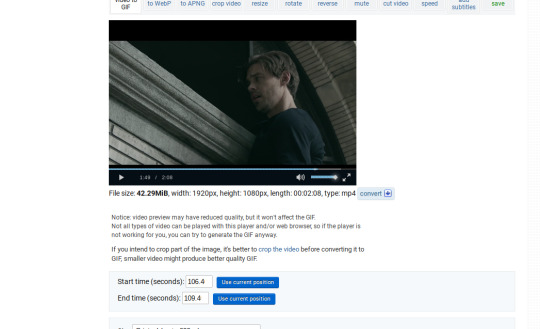
Once you have the start and end time recorded, scroll down to the next part of the screen with the size options. For size, select “540xAUTO (for Tumblr)” since tumblr gif sizes start at 540p and go down the more gifs are in a row. For frame rate, try to do either 20 or 25; the higher the frame rate, the smoother the gif will look. If you are trying to gif something in 540p that is longer, you might need to chose 10 to keep it under 5mb, which is the tumblr gif size limit. For method, leave it on FFMPEG. Then hit, convert to gif.

your gif will now look something like this!
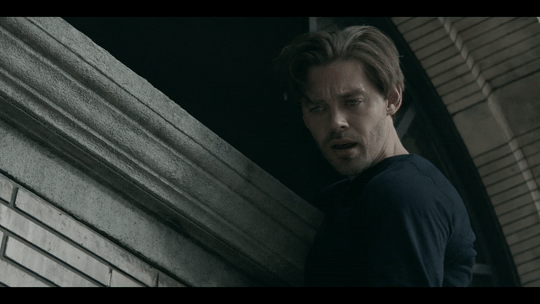
Now, this gif is currently 5.7mb, which is above the size limit for tumblr (5mb or above gifs will still play if I recall, but the quality will be really bad when you post them). If I was planning on keeping the gif this size, I would go back and change the frame rate to either 20 or 10 to get the size down. However, I am going to resize the gif to 268p, so I don’t need to worry about it being to big.
Using the correct gif size for tumblr is one of the easiest ways to make sure the gif looks good! For gifs that take up a whole row, the size should be 540p wide. For two gifs in one row, the size is 268p each. For three gifs in one row, the sizes are 177p, 178p, and 177p in that order. Here is a visual of it.
The next step would normally be resizing the gif, but Prodigal Son youtube videos come with a black banner on the top and bottom that I need to crop out. You will see a menu full of options under your gif, and you want to click on “crop.”
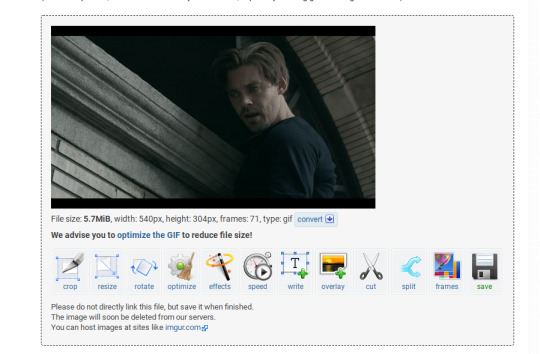
Cropping is pretty straight forward; you just move the little box over the part you want cropped, then hit the “crop image” button. Make sure width stays 540p!

Your gif now looks like this
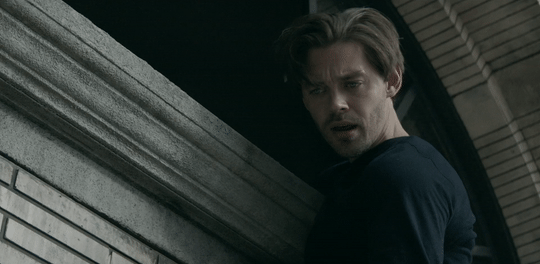
Next, you look at the options under your gif again, and go to “resize.”
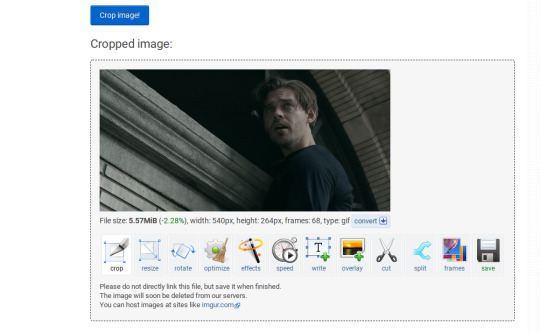
Again, resizing is pretty straight forward. I just put in 268 into the “width” section and leave the “height” section blank since the site will automatically resize the height. You can ignore the other menu options.
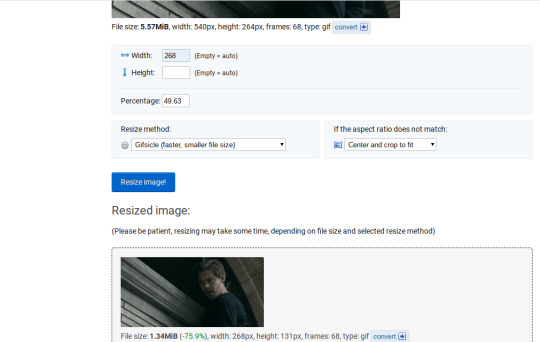
Your gif now looks like this

Next step is optional, but I usually do it. Once again, you go to the menu of options under your gif and select “speed.”

Speed is also super straight forward. I almost always reduce the speed of my gifs somewhere from 90% to 80% no matter what, just because I think it makes it look smoother. For gifs that are of short scenes that go really fast, I will reduce it to anywhere from 70% to 50%. You can try different speeds to test out what you think looks best. For this gif, I’m going to put it at 80%.
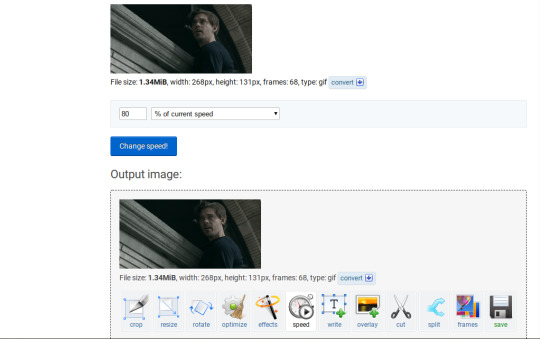
Here’s what we have so far. Congrats, you have made a gif!

Now for the fun part!
2. Coloring the gif
Go to the “effects” option, in the menu under your gif. You will see a LOT of options, but the panels I’m going to focus on are “colorize”, “brightness and contrast” and “color presets”. This section is going to vary a lot depending on what specific video you are giffing so remember to be flexible and try lots of different options out! It took me a while to get to a place where I can just eye a scene and know what settings to use. It’s super easy to go back and tweak a setting if the gif doesn’t look like how you want it the first time, but it’s a lot of trial and error.
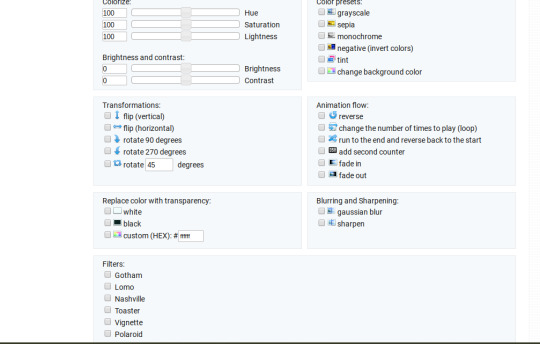
The main option I focus on in the “colorize” section, is “saturation.” This is what will make all the color in your gif pop out. The saturation I use varies a ton; for scenes that already are colorful/bright, I usually keep it around 120 to 150, since you don’t want it to be over saturated. If I’m making an edit that is supposed to look toned down or more grey/neutral tones, I’ll decreases the saturation in the range of like 90-40. For a show like Prodigal Son, where there is basically zero color vibrancy, I tend to go full out with saturation, usually in the 150-200 range. For this gif, I have it all the way up to 200.
Next is brightness and contrast. This also varies wildly, but a good rule of thumb is I always try to keep my contrast at least 5 points higher than whatever my brightness is, it just makes the lighting more even. You need to find a good balance; obviously, the darker the scene, the higher you want the brightness and contrast, but if you go too high, the gif with be staticy/grainy. For Prodigal Son, which has horrible lighting, my brightness is anywhere from 10-30 and my contrast is anywhere from 15-35. For this gif, my brightness is on the lower side since the scene is outside in natural light; brightness is 16, contrast is 26.

After you get those settings, I go over to “color presets” section and click on the “tint” option. It will pull up a color chart that looks like this
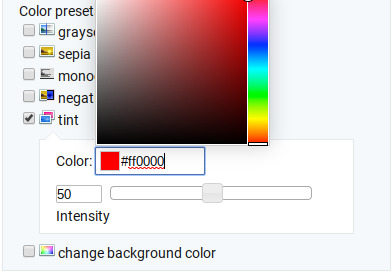
You ALWAYS want the intensity up to 100. This part is where the most trial and error occurs; there isn’t any one color option that works for every gif. The shade I use most often is light red/pink or light blue/light purple. For scenes that are lacking warm tones (which is almost all of Prodigal Son) I tend to go to the light reds, and for scenes that are lacking cool tones, I go to the light blues. The light reds are best for making characters skin tones look more...like actual skin tones and not totally washed out. To select a color, you just move your mouse around the chart. This is the range of color codes I tend to use.
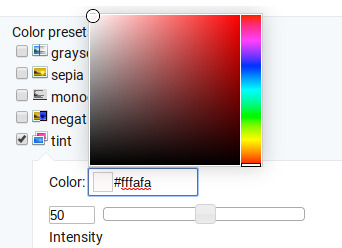
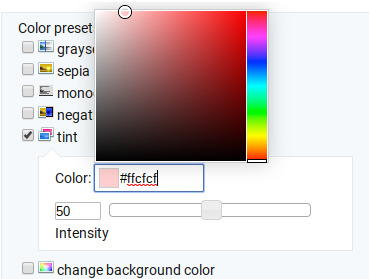
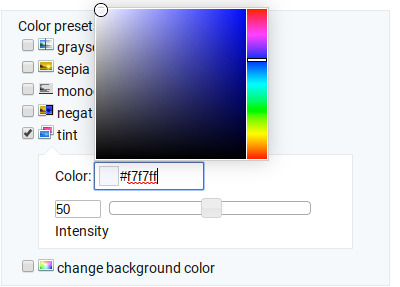
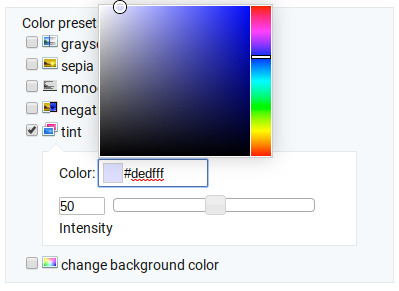
Again, intensity should be up to 100 (it automatically starts at 50 and I was too lazy to move it while getting screen shots :P).
For this gif, I actually used a new technique I’ve been trying out where I start with a light blue tint to even out the color tones, then once that gif is done, I go back to effects and add a layer of pink to make the colors brighter. Usually, one color works fine, but sometimes it’s hard to find a good balance (the red colors can get too red and the blue sometimes brings out too much of a yellow shade). For now, I have my color tint set at #eeebff.
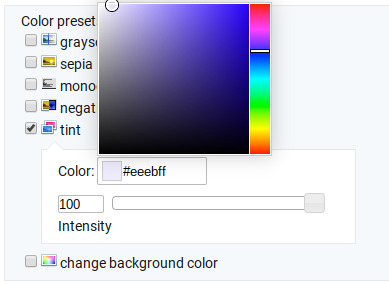
Ultimately, this is what my effect settings look like and this is what the gif looks like now.


Now, like I said before, I added another layer of tint to this gif. All you have to do is go to the menu under your gif, and click on effects again.
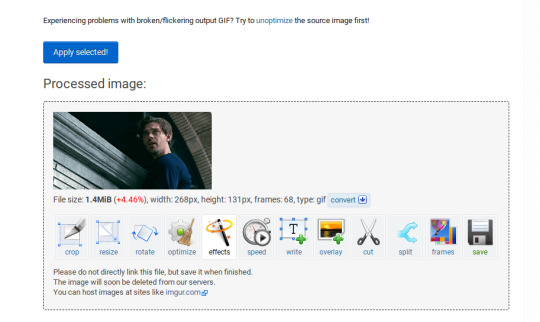
It will take you back to the panel you were just on, expect now your colored gif is on the top and all the settings are blank again. The only setting you need to use now is the tint option; go there, and select a light red shade. I used #fff0f0.

And here is the final gif! To save it, just right click and hit “save image as.”

I know it seems like a long process, but once you get a hang of it, it goes by super fast, especially if all your gifs are coming from the same video.
BONUS: Adding text
If you are trying to gif something with dialogue or you want a quote to put over your gif, you will want to put text over it. ezgif has a “text” option that you can use if you want, but I personally don’t really like their font options, so I use the website Online Image Editor.

This is what it looks like. You can either hit “upload an image” and upload your saved gif, or you can go back to ezgif, right click the gif, hit “copy image url” and paste that url into the “upload from url” option. The web page should now look like this.
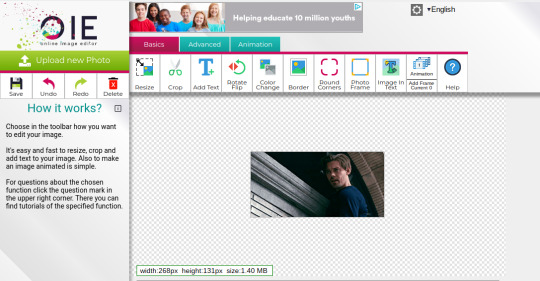
It’s pretty straight forward from here; click on the “add text” button and a menu will appear on the left hand with options for the text.
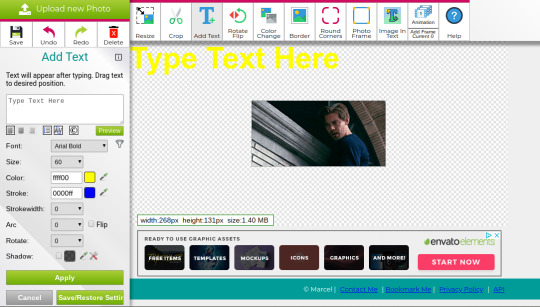
Type whatever you want the caption to be in the “type text here” box. This website has a ton of font options you can play around with, but when I just want to caption a gif, I stick with “Arial Bold Italic.” For a 268p gif, the font size should be 10-12, depending on how much writing you plan to put on each gif (if some gifs are going to have more writing than others, pick a smaller font size so it stays consistent!) When I make a 540p, the font goes up to 14-16. I use white for the color and black for the stroke. I make the strokewith 3 because it makes the caption stand out more. Once all these settings are selected, hit the “preview” button under the text box.
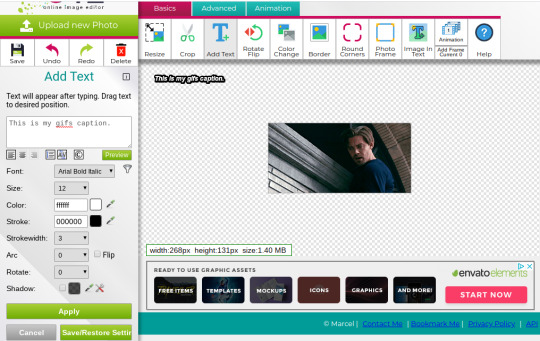
You can now drag your text anywhere you want on the image! The only bad thing about this website is that it doesn’t automatically center text, so you either have to eyeball it, or if you’re picky, like me, open up one of those online ruler applications and use it to measure out the center. For captions, I move the text just slightly above the bottom of the gif.
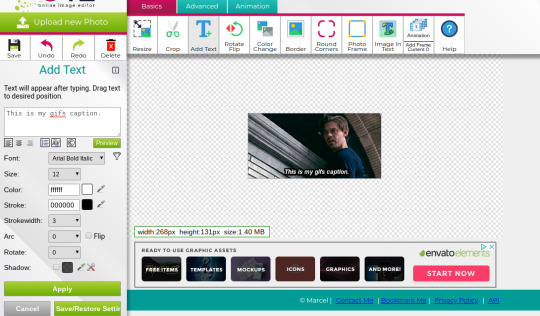
Finally, you hit apply. Once your gif has the text on it, all you have to do to save it is right click it and hit “save image as.” And here is the finished project!
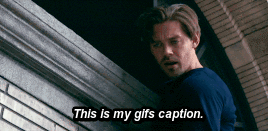
That got a lot longer than I thought it would, but I hope it was informative! If anything was unclear or if you have further questions, feel free to send me an ask. Thank you for reading.
#gif tutorial#giffing tutorial#giffing#gifmaking#mine#my gifs#long post#I hope this makes sense lol#pls rb if it helped!!!#also if mobile doesn't keep the read more...idek
383 notes
·
View notes
Text
Deleted TWtaH Scenes
[Original opening sequence for chapter 1]
The kitchen once held no less than twenty cooks at a time back in its hay-day at peak hours, and at least four during downtimes.
Now, there was no need for that many cooks, however. There were less agents this time, less funds which meant less provisions, and a dejected look inside the nearest fridge yielded even less ingredients that can contribute to a coherent dish.
The only fitting solution was the age-old family-friendly Overwatch (and Blackwatch, of course) version of Russian roulette: the "Surprise Menu".
The small pot of translucent slop bubbled gently by its lonesome atop a gleaming stove meant for the meals of thirty agents of varying tastes.
A ‘ping’ notified you that an order was placed. A quick glance at the name (Agent McCree) already had your hands grabbing for cabinet doors and bowls.
McCree always ordered from the regular menu, even when it contained things that he would leave untouched (like the octopus salad four days ago) or when it would have nothing he liked to eat (he leaves everything half eaten those days, except the bread—he usually asks for seconds regardless of the type).
The previous Commander Gabriel Reyes had forced him to choke down anything that was being served on the "Surprise Menu" that day for being a little shit. Jesse McCree can now eat anything, but the grimace on his face made it clear he would rather not.
Soldier 76’s ratio of “Surprise Menu” to “regular menu” was fairly even. He would take the tray and disappear for several short minutes before returning the tray, completely devoid of any traces of food. You were never sure if he ate all of it or if he has just eaten a little and chucked the rest, though a check of the base's garbage disposals just made you then wonder if he actually flushed the food down a toilet somewhere.
"Thanks, it was good," he would say when returning his tray. Only ever compliments. "Better than sewer rats," he had once said. Though, he did once admit the chicken was too spicy in one of your dishes.
D.Va bristled at the suggestion and demanded for more spice immediately after.
You endeavored to warn 76 of spicy dishes on the Surprise Menu and to find ways of adding more flavor to those of D.Va's.
The plastic tray echoed a finality against the window counter that bounced off the far away kitchen walls and rung in your ears.
You flip through the worn list hanging by the refrigerator nearest you.
Foods must be similar in portion.
Foods must be similar in consistency.
Foods of different color cannot be next to each other.
Foods of different temperatures cannot be next to each other—
You didn't even hear the doors to the cafeteria swing open.
Favorites (at least one for every meal):
Curry with soft beans (ABSOLUTELY no hard solids, no half-cooked beans. Chili is not acceptable substitute!!) Potatoes (plain) Extra short grain rice (extra water) Basmati rice (normal water)
**When cooking rice, wash four times (taste is noticeable otherwise)
A ‘ding’ of the overhead monitor alerted you that someone had placed an order.
Zenyatta did not eat, and Genji's limit was a cup of tea half the size of his fist and a sweet, but they enjoyed sitting near the kitchen window to speak with flashes of your hands and the clinking dishes set in front of them, but never for them.
[Deleted scene of Chef fighting back against Talon]
The video plays.
A team of six sweeps through the cafeteria, and immediately, he sees the issue which has the team swarming the kitchen door and the service window.
The lights were on.
Even though he knows of your fate, he couldn’t help but feel a tinge of fear grasping at his chest. They split up into two teams. One checks the window–they signal to the other team around the corner, and they signal back, guns at the ready.
He can see them count down with each wave of their hand.
One.
Two.
Three–
Hanzo expected that when it happened, you’d walk out daintily, the same way you put down a tray noiselessly, the same way your fingers touch the marble service window, the same way you touch your fingertips together when in thought, the same way you gesture–all soft flourishes and curling fingers.
But no.
You stride out through the double doors like a storm, head ducked down to avoid any deviant bullets, armed with only a large soup ladle made to handle a meal fit for five and a deep furrow in your brow with a scowl to match.
And then you begin to swing. Not wildly, but small, precise sweeps of little circles and sharp flicks of the wrist that cleanly disarm the shocked Talon operatives before slamming the underside of their chins. Even he has to give a sympathetic wince when their teeth clack together, or even worse, when they don’t.
Up close, he can see you still wear your chef’s uniform, all white and emblazoned with the Overwatch logo right on the sleeves of your upper arms.
You only had three of them; the other three take their shots through the window.
He sees you reach back with your free hand inside the doors, and immediately, a metal door comes slamming down behind the window. The Talon operatives jerk back, lest they get their arms caught.
He’d never admit it, but he swears that his hair has just become a bit greyer after watching the surveillance video.
[Deleted scene of McCree’s interview with Head Chef Richard v1]
The meal is delectable, but he doesn't taste it. Countless experiences with chasing spirits and tobacco did not come without a price.
Even so, he makes a show picking at his food with enthusiasm. Just enough to show interest but not overly flatter and be taken for a fool.
[Filler]
“Cœur d’Artichaut.” The man flips the card elegantly between his long, thick fingers. “A leaf for everyone. A bit of love for everyone. Sounds good, no? Everyone deserves a bit of love."
He then holds the card still and places a gentle kiss on it, letting it cover his lips as he murmurs, "But what that means is to give and give and give until you’ve nothing left.”
The man takes a moment to pull out a pack of cigarettes and lights himself one, silently offering one to the disguised McCree. Not one to turn down such an offer, McCree takes one for himself, leaning into the flame when the chef holds the lighter to him, his dark hand cupping around the flame and McCree’s face. It’s an oddly intimate gesture that he can't be sure isn't because he's being polite. McCree just hopes the heat doesn’t affect the hardlight contours of his disguise.
A plume of smoke gushes from the chef’s mouth. The grey wisps caress his sharp cheekbones and winds itself around his head, allowing only his lighter eyes to shine through. It reminds McCree of a mythical creature.
"It iz a chef’s responsibility to take care of their customers. Cook ze best food for them. Love them with all our being. We chefs exist for them.” A bitter quirk of his lips accompanies the change in his tone. “We die for them. Their bodies are built on the meals we make, and so we must give as much as we can to help our customers face another day. This, of course, includes love."
"I see ‘love’ is a running theme with this restaurant. Could you tell me what you mean by ‘love’?" McCree raises his tablet and pen.
Just when he’s about to interrupt the silence with another inquiry, Richard takes another drag of his cigarette and stares out into the distance.
"Love,” he begins. “No greater form of love than to nourish another's body and soul. It can be as simple as a prayer or as complicated as picking out ingredients and cooking them in a way that is appropriate for that customer and that one customer only. There are many ways to love and show love. But to give and give and give love but not receive, even the greatest of lakes will run out. Love is an ingredient. Love,” he stresses with a wave of his hand, “iz not infinite."
"But love isn't an ingredient you can put on food, is it, sir?"
The chef's eyes slide over, fixing itself onto McCree's face for a moment, so piercing that he's sure he can see through the disguise. It sends shivers up and down his spine. He’s being measured, judged, like a fish on the chopping block.Mercifully, Richard looks away, letting the smoke rise out from between his teeth. Something like a laugh makes the smoke stutter.
"It is the food. It is the effort. The thought.”
“And so you plan on carrying on the ideals of the previous CEO?”
Richard barks a laugh.
“Of course not. That foolish, naiive child."
“Could you explain?”
“Mm. A naive, desperate people-pleaser. That sort of love means little. People like that ought to have more self-respect.”
“There’s nothing wrong with a chef doing their best, is there?”
Richard waves his hand dismissively. “Of course there isn’t. But doing one’s best to satisfy their customer’s paletes is different from being a doormat.”
[Filler]
"That child does not understand that love can flow in many directions."
[Filler]
"I am here to restore the balance and clean up ze mess my...protégé...has made."
"Hm. So long as my protégé remains a child, then this toy will remain in my possession."
[Filler]
"Even chefs must eat."
[Filler]
"Do parents not give their lives for their children? It iz an obvious conclusion."
Protests and bitter memories that illustrate the contrary almost make it out of McCree's mouth. Instead he swallows them down and replaces them with a, "Of course. There's no parent who wouldn't."
No other lie has ever burned his tongue so.
[Filler]
“I hope this interview has been…enlightening…" There's something about the way that word is said that puts his nerves on edge.
"Oh, it has. Thanks very much for your time."
Richard scoffs, snuffing out the last of his cigarette against the heel of his hand. Tough son of a bitch. No wonder he and Reyes got along so well. The butt makes its way into a pocket instead of on the ground and Chef Richard opens the back door.
Over his shoulder, he calls, "Please do come again in the future. I look forward to reading your article. As thanks, we will have...surprise meatloaf waiting.”
McCree’s shoulders draw back tight and he fights every instinct to not stiffen and turn around. Instead, he keeps walking, a wry and defeated smile on his face.
“Oh, and tell that child that one should not preach about love if without having experienced it in full."
The smugness could not be any less evident, and the door slams shut, allowing the threat to linger in McCree's ears.
Sonnavabitch.
[Deleted scene of McCree’s interview with Head Chef Richard v2]
He’ll have to evaluate their true value, but decades-old wine definitely has buyers and he thinks he may know one or two. It’s not gentlemanly to let a favor like this go unpaid, and he’s already got a few ideas on how to do it.
And that’s how he finds himself here, sitting in the very back of Cœur d’Artichaut, bathed in the afternoon sun with his laptop, pouring a tiny pitcher of espresso into his coffee. He never understood fancy places and their need for so much extra silverware and fine china when the food he’s eating is the size of a well-used soap bar.
At least it tastes better than one.
Glazing across the restaurant, he sees the person he’s supposed to thank, still talking to the General Manager, Argus.
With half the cup in his stomach, he puts his hands to keys and types.
‘Chef Richard Sauveterre, a chef of renown fame whose name is given reverence, not in written word, but through the mouths of those he has fed,’ the first few lines of his draft reads.
‘The very definition of tall, dark, and handsome, made more distinguished by thick cornrows that trace the sides of his skull like a crown, the remainder cascading down in a neat waterfall down his neck. He is King Midas in a chamber of heat, steel, and raw ingredients that he spins into award winning meals capable of turning the stoniest of hearts into gold.
‘Now the CEO of acclaimed charity restaurant, Cœur d’Artichaut. The heart of an artichoke, a leaf for everyone, is their motto.’
McCree pauses for a moment, licking at the scab on his lip, searching for the next words and filling himself with another deep sip of coffee when he can’t find them.
“Pardon the wait, monsieur Morricone.”
“Not at all, Chef.” McCree gets up from his chair and extends his hand. “I’m just glad you made time in your busy schedule for me.”
“Likewise.”
McCree was bracing for it, but the weight behind the chef’s handshake still catches him off-guard. It’s just one strong up-down motion with a firmness that softens as they let go, but it’s that immediate contact, that sheer presence that puts him off-kilter and reminds him that this man is not only a cook but also a world champion fencer who could give some of the lower and mid-tier members of Blackwatch a run for their money in terms of reflexes and sharp wit. It is not only his hands, but Chef Richard makes sure to lock eyes with him, pinning him down. While Gabe would look for weaknesses to be exploited, Chef Richard is looking for gaps to be filled.
At least Richard doesn’t greet him the way he greets Reyes: with more kisses on each cheek than should be necessary. Though he may have to attribute that distance to his current disguise.
McCree begins his usual spiel: who he supposedly is (Joel Morricone, freelance writer, likes long walks on the beach and freshly roasted coffee), why he’s writing this (following up on a previous article he wrote about the restaurant ousting their CEO), and a few general compliments to loosen up his interviewee.
In the midst of all that, Argus brings over Richard’s coffee and replaces McCree’s. Her movements are quiet and unobtrusive, befitting of a high class restaurant like this. If he didn’t know any better, he’d think she’s forgiven him for having written an article about them firing their CEO, but he knows better. She definitely debated turning him away at the door when he tried to come in ten minutes ago.
In return, Richard gives a brief summary of who he is and his accomplishments, factually and without embellishments as though he were talking about someone else. The names of awards and institutions he gives are fancy and long and would probably be more impressive if McCree actually knew them, but all he can do is nod and ask probing questions that makes him sound like he actually knows more than he does.
If McCree didn’t know his history any better, he would have missed that the man glossed over the fact he led Overwatch’s kitchens for a good portion of its existence.
Past the initial niceties, McCree begins digging into the real reason for his interview.
“Prior to this position, do you mind telling me what you were doing and why did you come here instead?”
“I came because I saw some article about a former employee of mine leaving behind unfinished business.”
“And where did you come from?”
“My mother’s womb, where else?” he says dryly, and McCree damn near types that down.
“I’m guessing you don’t want to talk about it.”
Richard smiles. “No.”
“O--kay. Let me remind you that this interview is confidential and you will be the first to review the contents before public—”
“I am aware.” Then he pauses as if reconsidering, his smile growing wider with a glint in his eye that makes McCree want to squirm in his chair. “If you must know, I was anchored.”
“Anchored?”
He doesn’t elaborate any further and McCree’s brain is working overtime trying to decipher his words and not let it show on his face.
Anchored. Tied down somewhere. Somewhere that you nor anyone else have been able to reach. McCree goes through all the iterations of what that could mean and he lands on either ‘prison’ or ‘out so far in the boonies that technology couldn’t reach him’. Either one is possible with this man.
“Right, next question.” He clears his throat. “Now that you’re here as the new CEO of Cœur d’Artichaut, what is going to be your strategy for the restaurant going forward and your current impressions of things so far?”
Richard’s eyes flit once between McCree’s disguised face and his own cup of coffee. There is a semblance of bitter fondness that lingers in the corner of his lips that is quickly covered by the rim of his cup. For the first time since this interview started, his demeanor shifts. McCree can’t explain it, but it feels like he’s no longer talking to Richard, a professional chef, but Richard, a person.
“Avoir un cœur d’artichaut.”
“Pardon?”
“‘I have the heart of an artichoke’. I love everyone who eats my meals, for everyone who has eaten my meals has a piece of my heart.” He sips at his coffee for a moment too long, . “This restaurant’s motto, ‘cœur d'artichaut, une feuille pour tout le monde’, iz something I had said a lot in the past.”
“So the restaurant’s namesake is from you?”
“The saying is not mine alone, but that seems to be so.” There’s a bitter twist to his lips like he wished it weren’t. “As for the direction of the restaurant, a lot of effort has been put already and I will not change what does not need changing.”
“Have you had a chance to speak with the previous CEO during the transition?”
“No.”
“And is there anything you’d like to say, any message you’d like to convey?”
“Yes. ‘Do it your own way.’”
“That’s it?”
“Did you expect a heartwarming speech?”
“Well, I was expecting something a little more personal?”
“Personal things should be told to the person in question, yes? And not to a...” Richard looks him up and down, real slow and deliberate. A shiver runs through McCree’s spine--the look would make a lesser person shrink in their seats and the way he says his next word would evaporate them from existence. “...mere reporter?”
McCree manages a grin. He’s seen scarier. “You’re right, you’re right. So if you don’t plan on changing the restaurant or giving any words, any menu changes?”
“I’d take away those awful pancakes,” he exclaims with a toothy grin and a flap of his hand, and McCree can’t tell if that’s supposed to be a joke. He doesn’t have to guess as Richard continues. “This menu is like a baby imitating their parents. Too many recipes similar to mine, not original enough.”
“Oh?” McCree puts his hands to his keyboard again. Food seems to be the way to get this man to open up. “I’ve seen raving reviews for ‘em—”
“Bah. Shitty taste buds. Zis thick piece o’ dough cannot be called, eh, pancake. Babies will choke and the elderly will die of malnutrition, zis--non, non, non. Zis is something only someone with bad tastes could like. But ze compote! ‘Ave you tried it? That is the only thing that makes it menu-worthy.”
The rambling critique of your menu goes on and on and Richard’s accent only gets thicker as his excitement pours out in unstoppable waves. As disparaging as though remarks are, McCree can’t help but get the sense that Richard right now is like a proud father, and he wonders how he can convey that to you in his article.
“A chef must always think of their customers. This menu is subpar, but I can feel the thoughtfulness in the service and selections.”
“Humans can eat most anything and survive, but it is a miserable existence. Gladden the senses, bring people together. Our dishes are made with love, but that love must come from somewhere. No chef can provide it all without having received any, and I will continue that mission here.”
[Filler]
“Please, stay for lunch. I do not wish to host a guest without showing proper hospitality.”
McCree suspects he’d probably be murdered if he does agree if not by Richard then by your own staff who already hold a grudge against him for having written an article about your forceful resignation without their consent. (A scoop is a scoop, and it made Richard come back to Gibraltar, so all’s well that ends well.)
“Thank you kindly for the offer, but I think you’ve shown me plenty.”
“It will be on the house.”
“Really, I’ll come by another day. Lots left to do.”
McCree pulls out a handle from his bag and presses a button, the rest of the cane materializing as he uses it to get up. Chef Richard is right there beside him with a hand hovering over his elbow.
[Filler]
“The next time you come we will have our specialty for you prepared: Surprise Meatloaf. Oh, and no need to be concerned; insurance will handle both the trucks you and your friends destroyed.”
McCree turns around but the door clicks shut behind him, the heavy wooden door now much more threatening than before.
He grins wildly to himself, dragging a hand through his hair.
That sonnavabitch.
[Deleted Scene of Reaper encountering Chef]
"Hello, dishwasher."
You turn and gasp at the stranger in the kitchen. “What the f—ATHE–!!”
The man explodes into a tidal wave of mist, and your mouth is covered with one large hand, claws digging to your face, the rest of your body held immobile by the darkness. “Now, now. No need for that, dishwasher.”
Dish–!!?
Paralyzing fear courses through you like lightning. You struggle to free yourself from the confines of...whatever it is that is holding you. You need to alert everyone. You need to get free. A threatening squeeze of your body--your spine pops a little and your recently healed injuries protest the rough treatment--and the bone mask in your face makes you pause for a moment.
“Now, be good; don’t call for help. I’m just here for a house visit.”
He removes his hand slowly.
“A house visit?" Your voice is shakier than you'd like it to be, brain buzzing with fright.
The mist detangles itself from your limbs cautiously, ready to strike and immobilize you against if you were to make a stray move. The blood rushes back into your head and brings spots to your eyes, drumming in your ears and making you more nauseated than you would've liked.
While you're busy trying to reorientate your body, the part-mist, part-man glides slowly around the kitchen, looking around. You can see him pause at some of the injuries the kitchen sustained during the Talon attack.
"Pity. That baker, Woo, really liked this countertop. She'd have a fit if she saw this."
Stunned, you stare at the wandering mist figure. "You know this kitchen, you know Patisserie Woo?"
He turns his mask toward you, and you’re sure that he’s raising an eyebrow behind it. The response, 'Obviously,' exudes from every fiber of his body. .
"Wait, who are you…?”
“Take a guess.”
You narrow your eyes, curling your fingers around your lips in thought. Someone who knows your past. Someone who knows you since you were a dishwasher. The chefs in this kitchen didn’t exactly have a high turnover, but there were very few people who knew you throughout your journey up the ranks. A man who first knew you as a dishwasher and called you such.
"Omar? Frederick? Johnny?"
“Try again.”
The fear and wariness ebbs away as the threat of death evaporates.
You search your memory. There's nothing familiar about this man except the way he stands, arms crossed and staring down at you. If you squint, you could almost overlap a memory with this figure.
“Come on, now. You picked up everything in this kitchen pretty quick. You can’t even figure this out for yourself?”
It hovers over the edge of your memory, just out of reach. Think, who is this person acting like? You’ve seen this behavior before.
The voice becomes soft, endearing almost as he utters, “Come on, dishwasher. You’re smarter than this.”
The image of a man, leaning against one of the counters during the lull between service, watching you attempt a new recipe with calculating eyes. You almost expect Head Chef Richard to appear behind him and slap him on this shoulder, watch them both get up and give each other a brotherly hug.
Your eyes widen.
"Gabriel.” Your mentor's voice and yours overlap in a breathy whisper. "Comman, commander Gabriel Reyes."
There's a hint of a smile in his voice when he says, “There we go, always knew you were a clever little thing, but I go by 'Reaper', now."
A slight flush goes through your cheeks, forcing out the icy sheen of fear that lingered in your veins. Even now, despite being on opposite teams, it is nice to be praised by the former Commander. However, your thoughts are quickly interrupted when you remember that this is Reaper--the Talon higher-up whom the recalled Overwatch were on the look-out for.
"What are you doing here?"
"House-visit," he repeats. You're not quite sure what that even means. "You're not supposed to be there."
Confused, you ask, "Be...where?"
Commander Reyes--Reaper--sweeps his arms out, gesturing at the kitchen in its entirety. "Here. You weren't supposed to be here that night."
Talon. The attack. You gasp, hand flying to your mouth and other protectively against your middle. Your wounds ache at the mention and quickened pulse.
“They were supposed to lure you out," he continues. "Leave the path open so that Talon can use the passage,” he rumbles.
"But I came back..."
"Right. Now I came to give you some information."
"Why would you do that...?"
He shrugs. "Because I'm feeling generous, maybe?"
A small laugh escapes the fingers covering your mouth. That can't possibly be true, but then again, he is--or was--Gabriel Reyes.
"You don’t trust me?"
It’s hard to trust someone who looks like the Grim Reaper come to life.
"I do," you say distantly. "Because I trust Command Reyes. And…” You hesitate. “And, you know, the Head Chef…he really loved you."
"That man loves everyone,” he scoffs. “Don’t bring him into this. Anyway," --he waves his hand around-- "don't you wonder about the attack that night?"
"Yes. Like how they were able to find the passage. It's only supposed to be known to kitchen personnel--wait." Something clicks in your head. "Were you the one who led everyone here?"
Reaper exhales something between a growl and a huff. "No, but someone in your little organization’s turned traitor."
The world got absorbed into a vortex, and you suddenly feel like you're free-falling or sinking or just dying. You can't breathe, you can't hear, couldn't think, not when reality decides to take an unexpected vacation.
You force out a shuddering laugh that sounds grating even to your own ears. "What do you mean 'turned traitor'? There's, there's no one who knows that would ever..."
You sink down to the ground, reality righting itself and your limbs feel like a ton of bricks or that you've been hit by them. It didn't really matter. You're trying to get your brain to function, to think. But the shock of his words were too much. You trust--trusted--everyone at your restaurant.
But...then...
“Turned traitor on you and your organization."
You clench your fists and bring them to your mouth.
"Reaper on premise! Reaper on premise! Repeat, Reaper is on the premise!"
"Took them long enough,” Reaper says at the exact same time you order, “Athena! Cancel the alert!"
"Command overridden. Reaper on premise!"
You give the man a weary look and he returns it with a shrug.
"Can I offer you a meal before you go?”
He laughs. “I don’t think you can make anything fast enough. Those Overwatch brats will be here soon."
You’re already walking to one of the refrigerators while he speaks and pull out a lunch box that was meant for Agent McCree before his mission, but given the circumstances, you’re sure it wouldn’t matter much. You can just make a new one anyway.
"Here you are."
He takes one look at the name written on it and tosses it right back at you.
"Give it to the brat. I don’t take sloppy seconds.”
You don’t even have a chance to retort before he disappears into a puff of smoke, slipping in beneath the door from which he came.
The kitchen doors burst open, Agent Soldier: 76 at the helm. And not a moment too soon.
“Kitchen personnel only!” you say, reflexively.
“Where’s Reaper?"
The other agents are spread out, alert, but some are looking around the place like it’s a tourist attraction. You cringe.
"I didn’t notice anyone here."
His sweeping gaze falls on you, and you’re suddenly an insect that’s been pinned, unable to escape from the piercing gaze of the ex-Overwatch Commander.
"Talk, Chef.” Nothing in his stance bodes any hint of compromise.
You know he doesn’t believe you. Not when you’re standing there with McCree’s lunch in your hands, wrapped and with no dishes around.
[Original scene of Hanzo’s first break-in into the kitchen]
He drops down from the top of the doors, only to freeze when you round the corner.
The words tumble out of his mouth ungracefully. “You’re a person.”
“Get out.”
The biting intensity in your voice is challenging enough for him to forget exactly who he is speaking to.
“I go where I wish.”
It’s the wrong answer.
He sees your eyes flash. In an instant, you’re trying to man-handle him out. Hands clumsily fisted into his gi, twisting, tugging, hips down and bearing weight against his bulk. However, you’re no match for a trained assassin. His reaction is too immediate. He has you on the ground, straddling your hips, pinning both your arms to your back with a hand, his other hand bracing himself on the floor by your head.
You try to buck him off relentlessly, like an animal.
“GET OUT!”
He grits his teeth, and presses tighter against your hands. Your breath comes out in a wheeze, and in the back of his mind, he’s aware that you will have trouble breathing.
“I do not take orders from a mere chef!” he barks.
You seize in his hold.
For a bone-chilling moment, he thinks he may have gone too far in his technique. His grip slackens just a margin.
You twist violently. He gets unseated just long enough for you to aim a knee up at him. He blocks it, and you are scrambling off the ground, hand reaching for something. Anything.
A ladle—you hold it out in front of you, the rounded end pointed squarely at his chest.
“Get. Out.”
He furrows his brow, aware that he’s all teeth and spitting fire. “Is that all you can say?”
“Agent Hanzo, you are forbidden here, get out.”
“What is the meaning of this?”
It’s Satya who stops the fight from the door, well within the boundaries of the rules set.
“Going into the kitchen is against Overwatch policy,” she recites coldly.
He can see you’re still ready to fight even though you are horrible outmatched. If he really wanted to, you’d be dead in an instant.
But those burning eyes promise him something more than a poorly attempted beatdown should he push the matter.
With a huff, he leaves.
She gives him a disapproving look, which he shakes off, angered.
[Filler]
The next day, he’s only mildly horrified to find two turrets stationed outside the kitchen doors, and is suddenly paranoid that there are many more waiting where they cannot be seen.
Hanzo does not know if it's you who ordered them or if the architect had done it off her own free will. (If he has to guess, you had explicitly requested it.)
The architect is extraordinarily good at her job--able to merely look at a building and understand the structure and blind spots even if she doesn’t fully appreciate the depth of this part of her skillset.
He could swear they’re all looking at him--glaring, even--ready to teach him a lesson for his transgressions.
It prickles at him.
[Alternate shopping scene with Chef and Hanzo]
The air, crisp with the snap of an impending winter, chills your lungs as you breath it in. It feels liberating.
The market is as busy as you remember it. Medication and a lengthy preparation time kept you sleeping past the normal time you'd be up and about, searching for the juiciest, freshest, and tastiest of produce. But at 0830, most of them were already snatched up by other more savvy people and chefs who have likely returned back to their kitchens to celebrate their prizes. Now only the more casual crowd remained, a steadily surging crowd.
Agent Hanzo stands right at your elbow, being one of the few agents who were awake when you were plotting to leave and caught you in the act of trying to disconnect yourself from the supplies that are theoretically keeping you healthy. (You’re fine. You can stand and walk with minimal trouble, so a few hours outside shouldn’t be an issue.)
“It is not safe by yourself. I shall accompany you,” he declared like it was a given.
You just didn't have the energy to fight him. After a few failed attempts to even stand up from your bed, you figured it wouldn't hurt to have him around in case your body decided to betray you. Athena, bless her, was blissfully complacent in letting you both go once you promised you would take it easy and forced Hanzo to take responsibility for protecting you (and that you'd both return by lunchtime; she threatened to send other agents after you both and you shudder to think of the commotion that would cause).
So far, Hanzo’s been attentive and pleasant company with an occasionally sharp comment that is more witty than barbed and a helpful hanp.
“Is there anything you'd like for lunch or dinner today?”
“Are you so unwell that you are now taking requests?” he asks incredulously, glancing at you briefly with a raised eyebrow before sweeping the crowd with his eyes.
“Very funny, Agent Hanzo. I’m serious.” You pick up a radish and look it over. You can make radish curry with this. Agent Symmetra would probably like that--something closer to home--or maybe radish salad, or garlic roasted radish with feta cheese, or maybe even grate it into a yogurt sauce. “Since you decided to accompany me, it's the least I could do.” You didn’t have much else you could give to him or do for him anyway.
He scoffs, a tiny smile at the corner of his mouth shows it’s not as condescending or mean as it sounds. “Anything you can make without dropping.”
“That was once! And you dropped way more things than I did.”
“The magnitude is greater,” Hanzo says flippantly, lifting the heavy bags he held so easily back into view. “Whatever you plan on making with this will be payment enough, I’m sure.”
Somehow, you couldn't help flush a little, unsure if it is meant to be genuine or teasing.
“If you don't decide soon, I'll make pepper soup.”
Hanzo just laughs, a light and actually jovial laugh that makes you flush a little brighter. It's a stupid threat especially against an Overwatch agent, but it’s all you have. But even so, he didn't have to make fun of you.
“I'm really going to do it, Agent Hanzo.”
He looks at you, a challenging gleam in his eyes that you've seen far too many times from other ill-fated agents who think the kitchens are a game. The look makes you burn just beneath your skin.
“Aren’t you supposed to reward me for my services?”
“And I will,” you say with a firm determination. “I promise.”
He has nothing to say to that, but the look on his face speaks for him: we shall see.
For the remainder of your shopping trip, Hanzo remains a quiet but intimidating presence behind you as you continued to pick out your produce. Hanzo still says nothing even after moving through several other booths where you take your time to buy and bargain for large and colorful peppers. He wordlessly takes your bags as you get them, refusing to return them to you even after you kick up a small fuss that quickly exhausts you.
[Filler]
A heavy weight in the middle of your back nearly makes you jump out of your skin and you clench your teeth to hold back the noise of pain that tries to crawl its way out of your throat.
At your ear, Hanzo mutters, “Come.”
“Is someone following us?”
He doesn’t answer, weaving his way in and out of the crowd with you held close to his side. Absentmindedly, you realize he’s quite warm amidst the autumn air. As sharp and callous as Hanzo is, he sure is comfortable. It’s presumptuous, but maybe you could ask him if you could take a nap against him when he has the time. Maybe for half an hour or so. Just once.
You’re startled out of your thoughts with a quick jostle. “Chef, hurry.”
“Okay, okay.”
“Stay beside me.”
“Do you see something?”
Again, he doesn’t answer.
You can see him scanning the area as though seeking a route. The number of people have thinned considerably, leaving you both exposed. Hanzo keeps you by the walls of what buildings are around, but those are quickly becoming sparse, too. There’s a constant flex in his jaw and it’s clear to see he’s a little agitated.
“Oh!”
You reach for one of his hands--it’s also very warm and very large--and begin to pull with what strength you had even as he tries to snatch it back. You both need to stay together and this is the best way to ensure it even though you’re very sure he can keep up against your injured self.
“Wh—”
“This way.”
You know Gibraltar better. You know its secrets and its truths and exactly how to lose people here. Hanzo, perhaps knowing this, follows obediently after you--he has no choice, you have his hand.
The bags are definitely slowing you both down and a small ache begins to settle around your stomach and sides--the pain medication must be reaching its end, but you push forward through small alleyways that barely fit the both of you until you both made it into the Siege Tunnels where you both took turn after turn into the winding dimness.
“We...we should be safe here,” you huff.
He nods and says nothing, both of you listening, backs pressed against the chilly stone walls, listening for anything beside the echoes of the whispering wind or cries of the many macaques that call these tunnels their stomping ground.
The darkness makes it hard to see anything, but it only makes everything else just so much more apparent especially the proximity between yourself and your bodyguard for a day. You notice you still have his hand in a death grip but you refrain from saying anything: there’s no telling if the danger has passed yet and you didn’t want to risk making any more noise (and he hasn’t tried to pull away again after the first time). It’s embarrassing and downright childish, but you had to admit you felt just a little safer just having him beside you as a solid and warm presence.
You’ve worked alone for so long, it was nice to be in such close proximity with someone who is not looking to you for orders or putting the pressure of work on you. How many years has it been since you were free of expectations? When was the last time you stopped vying for the approval of others?
It must have been a long, long time. All of your actions had you wrung out and stressed, looking over your shoulder at every whisper and imagined gaze. Were the UN after you? Was the Head Chef there? Were your staff watching your every move and judging you? You didn’t ever feel certain even as you rose higher and higher in the world--it felt like each step toward what most people would consider to be an ‘accomplishment’, you became one step closer to uncertainty, trapped by silver walls and isolated from everyone else around you.
This impromptu trip was a good idea even if it made your muscles hurt. Agent Hanzo didn’t judge you, didn’t try to give unnecessary praise or respect, or treat you any lesser. He’s good company with a discerning eye and even better jabs. Maybe next time you decide to sneak out, you’ll tell him first.
Somehow, you realize you’ve closed your eyes as you were thinking. The cool stone at your back and the warmth at your side is intoxicatingly comforting, the shoulder beneath your head is a little hard—
“Oh! I’m so sor—” You bite your words back, forgetting momentarily you both were on the run, a chill running up and down your skin because what if--.
“It’s fine. I believe we are clear.”
You breathe a sigh of relief. “Great. We can take this tunnel straight back to the Watchpoint. It’s a bit of a walk, but I think it’ll be faster than going back outside.”
You push yourself off the wall with a grunt of effort. After running around so much and taking a break, your muscles refused to cooperate. Hanzo gives you a strong pull with the hand you have gripped tight.
Again, you flush with the realization. The danger has passed, there’s no reason to keep holding hands.
“Sorry, I didn’t really--I can let go, if you’d like? This must be stopping you from doing your job.”
A contemplative look crosses his face, but it’s difficult to tell in the dark. After a moment’s pause, he gives your hand an experimental squeeze and says, “No. We’ll stay like this. So you cannot get lost in the dark.”
There’s a hint of a wicked smirk in his voice that’s somewhat playful and again, a warmth blooms just underneath your skin; a mix of embarrassment and indignity.
“I can find my way around with my eyes closed!”
“Shall we try? I will not warn you of walls, just so you are aware.” Regardless, he walks with you, close to your side.
“I don’t want Athena to send a team after us, so next time!”
“Next time.” The way he says those words sounds like he’s testing them in his mouth. It’s hard to tell what he’s thinking, but you swear you can hear his smile. “Next time.”
[Deleted interrogation scene between Chef and others]
The facts were laid bare before him once more in the morning when Hanzo speaks to Winston, Soldier, McCree, and a holovideo of yourself and Ana.
It is almost like a trial, the image of your listless face, turned away from the monitor, sits on the central terminal of the meeting room for everyone to see and judge. It's the first time Hanzo had seen you since you were carried out of the Cellar by Soldier--the Cellar which has been opened up by order of Winston and interconnected with Athena's systems, yet the secrecy of it's entire contents remained mysterious by effort of the Junkers and the AI herself. It may be a small comfort to you to know that not everything was defiled, but he doesn't know just how much you knew about the state of your kitchen.
But today's meeting wasn't about that.
You were told to deliver the facts of what you've been doing and your dealings for Overwatch. You did so, slumped in your bed without care for appearances or the usual politeness that came with your service, answers flat and pointed. Normally, this type of disrespect and blatant disregard for manners would earn his ire, but instead, it makes him uneasy.
It is not the look of an injured person on the sliver of your face, but your whole body told the story of someone who has given up after a long, harrowing effort.
You confirmed that you owned a restaurant, the card of which sat on Hanzo's scant dresser. It explained the service, the food, the aesthetic. It seemed so painfully obvious that Hanzo wondered why he never saw the connection before.
When questioned about the previous head chef, you admitted you didn't know where he was. You should have set off for France, but you knew he wouldn't go there. Some personal issues that you never understood and no one wanted to question.
You distantly confessed the amounts you've given Overwatch, the methods for contacting donors, and the sloppy way you went about verifying them. Even sloppier were your attempts to make the transactions seem legitimate and the lengths you went through to protect Overwatch, the donors, and your customers from the potential fallout.
All throughout, you refused to look at them or give excuses, only clinical facts and simple 'yes' and 'no's.
"Anything else?" you ask wearily.
"No, we will let you know if we require further information. You have given us enough for now. Please get a good rest," Winston says.
Nodding at them, you lean back into your pillows, and let out a bone-rattling sigh. Mercifully, the screen turns off
There is a deafening silence that follows.
They have been given a lot of information to digest and Hanzo, long grown out of the habit of writing down thoughts during a meeting, finds himself wishing that he had if only to organize the chaos that you’ve thrusted upon them.
It is an incredible tale, regardless of the number of times he had to hear it. The amount of danger, sacrifice, and sheer naivety involved
"The donors can claim ignorance then."
"It was well planned." Even Ana sounds slightly impressed, toying with the string of her teabag. "If the auditors checked, only Chef would take the blame." A smirk comes over her face. "Ah, doesn't that sound familiar, hm, Jack?"
The man grumbles something unintelligible.
"What's that, Jack? I did not quite hear you."
"The restaurant workers are just as guilty. They are accomplices." Ana rolls her eyes at Soldier's obvious diversion but allows it to proceed by sipping on her drink.
“The way it’s set up, only Chef handles the finances. On paper, as far as the other two go, they can say they didn't know about the operation...”
[Filler]
It's not safe for them to continue sending the money especially not after they had their run-in with the auditors. It wouldn't take long for an investigation to find both the restaurant and Overwatch guilty of money-laundering.
What is the best thing to do?
Hanzo's brows furrows, painfully tight as he rummages through his mind for the correct answer.
He is not well-versed in Gibraltar law and even less so with financial laws involving a charity like yours.
"It's smarter this way."
"Though how they plan on covering the gap is beyond me. The timing is too convenient and matches the auditors' investigation too well."
"Wouldn't it be weirder for them to stop?"
#my writing#twtah#deleted scenes#some of them were rewritten to hell and back#i thought about posting a compilation fic on AO3 with this but they're not long enough for me to feel like they should be up there#happy 2021
10 notes
·
View notes
Text
[Start of Tldr: I think the belief characters are multifaceted should be extended to real people and concepts. I think:
Homophobia is a multilayered and multifaceted issue.
Homophobia manifests in varied ways, including ones informed by other axes of oppression and marginalization.
Real people are multilayered and multifaceted.
The show’s characters are multifaceted and multilayered.
People’s reasons for finding homophobia in a character or aspect of the show will be multifaceted and may differ wildly from person to person.
Creative intent might not always come through when multilayered human beings are using multilayered characters and scenes to convey something to multilayered individuals who have different life experiences and perspectives.
That understanding doesn’t require agreement.
The reason I find this fandom so tedious isn’t because of any one interpretation, set of interpretations, or particular routes used to reach particular interpretations. The reason I find this fandom so tedious is because of:
how many people will note someone’s high level opinion or interpretation, assume they know how the person arrived there, and respond to that person or anyone holding that view under that assumption.
so many people acting as though gaps between creator intent and impact, or disagreements between interpretations, must be coming from a place of malice, ignorance, and/or unexamined bias.
people claiming the show avoids depicting homophobia because it would be “harm”, but not acknowledging that by that logic the show repeatedly does racist harm. End of comically long Tldr.]
You seem to suggest this is a “I like waffles =/= I hate pancakes” situation, but I’m seeing something more like “the chef agrees with me his waffles are superior and the best thing on the menu, so people who still eat the pancakes are just being contrary.”
I don’t think you limited your post to people who act a certain way, but instead that it focused on people who hold a certain belief independent of how they behave. I see you going in on certain beliefs without a mention of negative behavior towards other fans.
[ @izzy-anti-archive, the idea of bringing up context and this possibly not being OP’s real opinion, is reminding me of how things sometimes go down with some of the fans who get pushback for making blanket statements about how thinking Ed has anger issues comes from a place of racism. I’m wary and weary of being in spaces with those particular people because of the blanket presumptions they make about people’s motivations for an interpretation, and because of how they speak to and about those who disagree with them. My reaction will be the same for people who do straightforward replications of their arguments and behavior, as it is to them.]
Intent matters, but it isn’t everything. Sometimes creators err when getting their intent across, just like people do in life. Sometimes creators are hindered in conveying intent by their own biases and experiences, just like biases and experiences might impact how people view things.
Viewers are capable of getting the creator’s intent without it displacing their read on a scene and character. Class resentment, class expectations, work environment, ever-present dangers, unrealized feelings, unrequited love, feelings of abandonment, fears about the real threats to his and Ed’s survival Stede poses, frustration with insubordination, etc. can all be considered and believed to be in play while still reading Izzy as homophobic.
If people are interpreting homophobia or racism and the writers are saying they don’t want to harm people by intentionally depicting those attitudes and actions, that intent should INFORM further interpretation.
I of course think that intent informing an interpretation doesn’t have to result in changing it; that understanding, and even holding, multiple perspectives is possible; and that things can be unintentionally depicted.
On the issue of “harm”: I hope I’m reading this wrong about the racism; and that no writer for this show has stated there was no intent to depict any racism. I already have a problem with the idea that depicting bigotry & injustice = harm (especially when we’re talking about internalized biases) because I think it’s infantilizing, demeaning, and has unfortunate implications about the ways the impact of marginalization on a character can be depicted in a show that is trying to “not harm”; but it’s extra fucked up to me when “depicting homophobia would be harm” is said without acknowledging the show’s repeated depiction of explicit racism. Same sense of fucked-upness goes for Con’s asinine claim the show is kind.
Again, I hope I’m reading this wrong and you aren’t suggesting this show doesn’t depict racism or that the writers didn’t intend to, but were speaking about media and creator intent in general. Unfortunately, some arguments from others I’ve seen for why the show shouldn’t be read as having any homophobia make it seem like some fans are okay with racism in a way they aren’t with homophobia. Some of the arguments come across as saying the show can be “kind” while subjecting characters to racism (including from the romantic lead), but subjecting them to homophobia would be unkind. If depicting homophobia=harm, then the show does racist harm intentionally and repeatedly.
Hot take: The people who are STILL insisting that Izzy is homophobic (despite the NUMEROUS instances of the cast/crew/David himself saying that nobody on the show is being targeted for their identity and ‘it’s not “I can’t believe he’s with a guy” but “I can’t believe he’s with THAT guy”‘ ad nauseam) towards Stede, Lucius, or Ed (I don’t believe I’ve seen anyone say anything about Fang or Pete, though I could be wrong, but I’m gonna touch on that in a bit too*)? They’re, unironically, being homophobic by stereotyping the characters and reducing them to just their sexuality.
If you recognize that Stede is a multifaceted character and you recognize the ways in which he is multifaceted - He’s a man born into wealth and raised on classist, colonialist ideals. Yes, he’s also traumatized by how he was treated by his father and peers but trauma doesn’t exempt people from blame when participating in, embracing, enforcing, and benefiting from classist and colonialist ideals - you will understand that Izzy is not being homophobic towards him just because he hates him.
If you only view Stede as a gay man and ignore everything else about his character then the only motivation for Izzy to hate him MUST be because he’s a gay man and therefore Izzy MUST be homophobic.
If you recognize that Lucius is a multifaceted character and you recognize the ways in which he is multifaceted - He’s a man who likely was born into some level of the middle class, given that he can read and write (It’s also possible that he was born into a working class family and he learned to read and write there, but it’s the unlikely option by default. None of the rest of the working class crew know how to read or write save Jim who was raised by a nun and would have been taught by her.), he also avoids doing work which is necessary for the function of the ship that they live on and depend on for their livelihoods and encourages the rest of the crew to do the same with his insubordination. He’s also in an unorthodox relationship that people who have not experienced the concept of consensual non-monogamy would not understand and might interpret as cheating - you will understand that Izzy is not being homophobic towards him just because he hates him.
If you only view Lucius as a gay man and ignore everything else about his character then the only motivation for Izzy to hate him MUST be because he’s a gay man and therefore Izzy MUST be homophobic.
If you recognize that Ed is a multifaceted character and you recognize the ways in which he is multifaceted - He’s a man of color, born into a working class family who worked hard to make a name for himself, to the point where he did not have to endanger himself or his crew to earn their livelihoods. He’s also some level of neurodivergent and understimulated by the environment he’s in (because he excels at his job) which leads him to make irrational and dangerous decisions and puts the lives of himself and his crew in danger. He’s also been making increasingly out of character decisions (corroborated by Fang and Ivan) by the influence of Stede - you will understand that Izzy is not being homophobic towards him just because he’s angry about his relationship with Stede.
If you only view Ed as a gay man and ignore everything else about his character then the only motivation for Izzy to be angry about his relationship with Stede (and only Stede, because he had no qualms about Ed and Calico Jack’s involvement with one another given that he sent Jack to get Ed out of the way of the English, but that’s another post I don’t have the spoons to make) MUST be because he’s a gay man and therefore Izzy MUST be homophobic.
If you IGNORE that Izzy is a multifaceted character and you IGNORE the ways in which he is multifaceted - He’s a gay (we’re not having this argument) working class man who earned his high ranking position on an extremely respectable pirate’s crew. He’s capable and is rightfully angry when he’s looked down on because of his class. He recognizes the importance of ship maintenance and is rightfully angry when those tasks are ignored. He doesn’t understand Lucius’ relationship dynamic and thinks he can use (what he thought was) him cheating on his partner (seriously, how is ‘I’m going to tell the man you were fucking that you were fucking another man’ threatening to out him?) as a motivation to make him do the necessary ship work. He is rightfully angry when his orders are ignored because he’s the highest authority on the ship next to the captains. He is in love with Ed and is jealous because Ed is in love with Stede - you can pretend that Izzy is homophobic because of how he behaves towards the other gay men on the ship.
If you ignore that Izzy has valid reasons for his actions (which does not mean that the actions are all entirely justified) then the only motivation for them MUST be because he’s homophobic.
(* The persistent neglect of Fang and Pete in these discussions is also rooted in homophobia. Fang and Pete are the only explicitly gay men on the ship who don’t, at any point, present ‘femininely’** and therefore don’t fall so easily into the bubble of the stereotypical gay man and so they get ignored in these discussions because they aren’t suitable to push the narrative that Izzy only interacts negatively towards ‘feminine’/’gnc’** gay men.)
(** The insistence that Stede, Lucius, and Ed are in any way, at any point, LEGITIMATELY presenting ‘femininely’ or are ‘gender non-conforming’ is ALSO rooted in homophobia - and I’d argue a touch of racism via Ed’s hair and beard as they relate to his indigenous roots. The assumption/association with those three being considered feminine comes from their identity as gay men. That is homophobia.
Stede wears men’s clothes. He wears RICH men’s clothes. Bright, colorful, patterned fabrics are worn by RICH men in the 1700s - if you want to argue that, say, king George presented femininely or was gnc because of the way he dressed be my guest but you won’t because he doesn’t and he isn’t. Lucius wears men’s clothes. His clothes are perfectly at place amongst the rest of the crew’s clothes. Ed wears men’s clothes. His leather is in direct relation to gay leather-men which is a hyper-masculine aesthetic in the same way drag is - typically - a hyper-feminine aesthetic. His appreciation for Stede’s clothes comes from the wealth and privilege that centers around the easy possession of those types and quantities of fabrics.
None of them behave in ways that are stereotypically feminine. Having and expressing emotions is not a uniquely or inherently feminine trait. Caring for and maintaining your appearance is not a uniquely or inherently feminine trait. Even if they were, Izzy also does those things. Izzy frequently expresses his emotions - yes, anger, a stereotypically ‘masculine’ emotion, but others as well. He also puts a great deal of care into his appearance, aside from the materials, the only difference between his and Stede’s outfits are the type of shoes and the presence of a jacket. If those traits are to be considered inherently feminine then it is disingenuous to not apply that label to Izzy as well.)
165 notes
·
View notes
Text
chapter 11 paragraph ix
The Purple Cow was on an untravelled one-way street just wide enough for a car to go through. All the other businesses around—pharmacy, bakery, bike shop—were shut tight, everything but an Indonesian restaurant on the far end. Shirley Temple let us off out front. On the opposite wall, graffiti: smiley face and arrows, Warning Radioactive, stenciled lightning bolt with the word Shazam, dripping horror-movie letters, keep it nice! I looked in through the glass door. The place was long and narrow, and— at first glance—empty. Purple walls; stained glass ceiling lamp; mismatched tables and chairs painted kindergarten colors and the lights low except for a grillside counter area and a lighted cold case glowing in back. Sickly house plants; signed black-and-white photo of John and Yoko; bulletin board shaggy with leaflets and flyers for satsangs and yoga classes and varied holistic modalities. On the wall was a mural of the Tarot arcana and, in the window, a flimsy computer-printed menu featuring a number of Everett-style wholefoods: carrotsoup, nettlesoup, nettlemash, lentil-nutspie—nothing very appetizing, but it made me remember that the last honest-to-God, more-than-a-few-bites meal I’d eaten had been the take-out curry in bed back at Kitsey’s. Boris saw me looking at it. “I am hungry too,” he said, rather formally. “We will go get a really good dinner together. Blake’s. Twenty minutes.” “You’re not going in?” “Not yet.” He was standing slightly to the side, out of view of the glass doors, looking up and down the street. Shirley Temple was circling the block. “Don’t be here talking to me. Go with Victor and Gyuri.” The man who sloped up to the glass door of the cafe was a scrawny, sketchy, twitchy-looking guy in his sixties, with a long narrow face and long freak hair past his shoulders and a peaked denim cap straight from Soul Train 1973. He stood there with his ring of keys and looked past Victor to me and Gyuri and seemed undecided whether to let us in. His close-set eyes, his brushy gray eyebrows and his puffy gray moustache gave him the look of a suspicious old schnauzer dog. Then another guy appeared, much much younger and much much bigger, half a head taller even than Gyuri, Malaysian or Indonesian with a face tattoo and eyepopping diamonds in his ears and a black topknot on the crown of his head that made him look like one of the harpooners from Moby Dick, if one of the harpooners from Moby Dick had happened to be wearing velvet track pants and a peach satin baseball jacket.
The old tweaker was making a call on his mobile. He waited, his eyes cagily on us the whole while. Then he made another call and turned his back and walked away into the depths of the lunchcafe, talking, palm pressed to cheek and ear in the manner of a hysterical housewife while the Indonesian stood in the glass door and watched us, unnaturally still. There was a brief exchange and then the old tweaker returned and with wrinkled brow and seeming reluctance began fumbling with the key ring, turning the key in the lock. The minute we were in he began yammering to Victor Cherry and throwing his arms about, while the Indonesian strolled over and leaned against the wall with his arms folded, listening. Some disturbance, definitely. Discomfort. What language were they speaking? Romanian? Czech? What it was about I had not a clue but Victor Cherry seemed cold and annoyed while the old gray-head tweaker grew more and more agitated—angry? no: irritable, frustrated, wheedling even, a whine climbing in his voice, and all the time the Indonesian kept his eyes on us with the unsettling stillness of an anaconda. I stood about ten feet away and— despite Gyuri, with moneybag, pressing in on me much too close—put on a self-consciously blank expression and pretended to examine the signs and slogans on the wall: Greenpeace, Fur-Free Zone, Vegan Friendly, Protected by Angels! Having bought enough drugs in enough dodgy situations (cockroach apartments in Spanish Harlem, piss-smelling stairwells in the St. Nicholas projects), I knew enough not to be interested, since—in my experience anyway—transactions of this nature were mostly the same. You acted relaxed and disengaged, didn’t talk unless you had to and spoke in a monotone when you did, and—as soon as you got what you came for—left. “Protected by angels, my ass,” said Boris, in my ear, having sidled up noiselessly on my other side. I said nothing. Even all these years later, it was all too easy for us to fall into the habit of whispering with our heads together like in Spirsetskaya’s class, which seemed like not a good dynamic in the situation. “We are on time,” said Boris. “But one of their men has not shown. That is why Grateful Dead here is so jumpy. They want us to wait till he comes. It is their own fault for changing the meeting place so often.” “What’s going on over there?” “Let Vitya handle it,” he said, poking his shoe at a desiccated furball on the floor—dead mouse? I thought, with a start, before realizing it was a chewed-up cat toy, one of several strewn across the floor beside a clumped and piss-darkened cat tray which lay half-hidden, turds and all, at the base of a table for four. I was wondering how a dirty cat tray placed where diners were likely to step in it was possibly convenient in terms of food-service logistics (not to mention attractive, or healthful, or even legal) when I realized the talking had stopped and the two of them had turned to Gyuri and me—Victor Cherry, the old tweaker with a wary expectant look, stepping forward, his eyes darting from me to the bag in Gyuri’s hand. Obligingly Gyuri stepped forward, opened it, set it down with a servile bow of his head, and stepped away for the old guy to look at it. The old guy peered in, nearsightedly; his nose wrinkled. With some peevish exclamation he looked up at Cherry, who remained impassive. Another obscure exchange ensued. The grayhair seemed discontented. Then he closed the bag and stood up and looked at me, eyes darting. “Farruco,” I said nervously, having forgotten my last name and hoping I would not be required to produce it. Cherry gave me a look: the papers.
“Right, right,” I said, reaching in the top inside pocket of my jacket for the bank draft and the deposit slip—unfolding them, in what I hoped was a casual way, checking them out before I handed them over— Frantisek. But just as I was extending my hand—bam, it happened like a gust of wind that blows through the house and slams a door loudly in a direction where you aren’t expecting it—Victor Cherry stepped fast behind the grayhair and whacked him on the back of the head with the pistol butt so hard his cap flew off and his knees buckled and down he went with a grunt. The Indonesian, still in his wall-slouch, seemed as startled by this as I was: he stiffened, our eyes connected in a sharp what the fuck? jolt that was almost like a glance between friends, and I couldn’t understand why he wasn’t moving away from the wall until I looked behind me and saw to my horror that Boris and Gyuri both had guns on him: Boris neatly resting the butt of the pistol in the cup of his left palm and Gyuri, one-handed, with the bag of money, backing out the front door. Disconnected flash, someone flitting from the kitchen in back: youngish Asian woman—no, a boy; white skin, blank frightened eyes sweeping the room, Ikat print scarf, long hair flying, just as quickly gone. “Someone’s in back,” I said rapidly, looking around, every direction, room wheeling around me like a carnival ride and heart beating so wildly I couldn’t make the words come out quite right, I wasn’t sure if anyone heard me say it —or if Cherry heard, at any rate, since he was hauling the grayhair up by the back of his jeans jacket, catching him in a chokehold, pistol at his temple, screaming at him in whatever Eastern-European tongue and jostling him to the rear as the Indonesian un-slouched himself from the wall, gracefully and carefully, and looked at Boris and me for what seemed like a long time. “You cunts are going to be sorry for this,” he said quietly. “Hands, hands,” said Boris cordially. “Where I can see them.” “I don’t got a weapon.” “Right there anyway.” “Right you are,” said the Indonesian, just as cordially. He looked me up and down with his hands in the air—memorizing my face, I realized with a chill, image straight to data file—and then he looked at Boris. “I know who you are,” he said. Submarine glow of the fruit juice cooler. I could hear my own breath going in and out, in and out. Clang of metal in the kitchen. Indistinct cries. “Down, if you please,” said Boris, nodding at the floor. Obligingly the Indonesian got to his knees and—very slowly—stretched himself full length. But he didn’t seem rattled or afraid. “I know you,” he said again, voice slightly muffled. Fast darting movement in the corner of my eye, so fast I started: a cat, devil black, like a living shadow, darkness flying to darkness. “And who am I then?” “Borya-from-Antwerp, innit?” It wasn’t true that he didn’t have a weapon; even I could see it bulging at his armpit. “Borya the Polack? Giggleweed Borya? Horst’s mate?” “And so if I am?” said Boris genially.
The man was silent. Boris, tossing the hair out of his eyes with a flick of his head, made a derisive noise and seemed about to say something sarcastic but just then Victor Cherry came out of the back, alone, pulling what looked like a set of flexcuffs out of his pocket—and my heart skipped to see, under his arm, a package of the correct size and thickness, wrapped in white felt and tied with baker’s twine. He dropped a knee in the Indonesian’s back and began to fumble with the cuffs at his wrists. “Get out,” said Boris to me, and then, again—my muscles had locked up and hardened; he gave me a little push—“Go! get in the car.” Blankly I looked around—I couldn’t see the door, there wasn’t a door— and then there it was and I scrambled out so fast I slipped and nearly fell on a cat toy, out to the Range Rover puffing at the curb. Gyuri was keeping watch out front, on the street, in the light drizzle which had just begun to fall—“In, in,” he hissed, sliding into the back seat and waving me to come in after him, just as Boris and Victor Cherry burst out of the restaurant and hopped in too and off we drove, at a sedate and anticlimactic speed.
#boreo#the goldfinch#the goldfinch donna tart#donna tart#boris pavlikovsky#theodore decker#theo decker#boris x theo#theo x boris#finn wolfhard#ansel elgort#oakes fegley#aneurin barnard#the goldfinch book#book#books#quote#quotes#lgbtq#lgbtqia#lgbtqia+#lgbt#gay#gay ship#gay ships#otp#mlm#the goldfinch quotes#the goldfinch quote#boreo quotes
1 note
·
View note
Text
Octopath Traveler: Review

Let me start by saying that, historically, I’m not a huge fan of turn-based RPGs. Ironic, given that my favorite game series of all time is Pokemon, but I consistently find most JRPGs to be a bit slow-paced and convoluted for my liking. Octopath Traveler, for the most part, managed to subvert my expectations and kept my attention for much longer than I expected going in.
Octopath Traveler is not terribly unique in its gameplay or story, but instead carves a niche in an otherwise crowded genre with stunning visuals, solid fundamentals, and a character-driven gimmick. The game begins with the player choosing one of the eight possible character options (ranging from a staunch, by-the-book knight to a “dancer,” a medieval-fantasy representation of a stripper). Each of these characters has a few tidbits of backstory to entice the player, but not much beyond that. I chose Ophilia, a cleric and the adopted daughter of this universe’s archbishop, for no reason other than she seemed fairly nice and I knew I would want a healer on my team.
The games largest problem became clear fairly immediately: the pace of Octopath’s cutscenes is glacial, and there are a lot of cutscenes. I immediately checked the settings menu for a quick fix, but the most you can do is speed up text speed slightly. Normally this would get the job done, but 50-70% of every cutscene is comprised of movement, not even actual dialogue. Between every line of speech spoken by a given character, their adorable little sprite twitches slightly to add emphasis to their next phrase. I was able to burn through the text itself, but the little interruptions added up and I spent a substantial portion of my playthrough watching nothing happen.
And it was a long playthrough. The average playtime for this game, completing the main story for each of the eight characters, rounds out to 60 hours, a hefty chunk for any player with a busy schedule. It took me several months of on-and-off play to finish the game, though I’m sure that a hardcore player could skip through a lot of the cutscenes and finish in under 50 hours. That said, I can’t really recommend skipping the cutscenes. As slow as they are, this game lives and dies by its cast of characters, most of whom I grew to love by the end of my playthrough. Each of the eight potential members of my team felt fleshed-out and I genuinely cared about the outcomes of their stories enough to see them through (though some were a bit more tedious/strained than others).
Unfortunately, the characters also contribute to one of the game’s other most frustrating features (or lack of features): there are dreadfully few interactions between the various figures that the story follows. Each one of them has five distinct missions, complete with their own little story arcs and supporting characters. The player completes each of these missions with a team of four, three of whom are merely background actors in the primary character’s adventure. Most of the time this isn’t terribly disorienting and can even be fun; the game offers little snippets of dialogue between characters showing how their personalities clash or compliment each other and I was able to fill in the gaps with how they might interact outside of combat. Other times, however, Olberic might engage in a heated one-on-one battle with his greatest rival...only for the actual battle to take place between Olberic’s rival and four magically-enhanced strangers.
I found myself ravenous for the rare moments of interaction between characters since so much of the adventure took place in various little vacuums. Every one of Therion’s snide remarks felt like a breath of fresh air in the absence of story arc crossover. Given, there is a bit of story overlap in the postgame, but if I have to wait that long to see the characters actually come together, is the game doing what it was marketed to do? Hard to say.
As for the rest of the game, it was highly enjoyable. The combat system’s use of weaknesses and shields is unique and complex and kept me on my toes, even against weaker enemies. I really enjoyed customizing my team, and once I unlocked multiclassing it felt like I was playing a whole new RPG. The visuals are stunning, using fabulous pixel art and some blurring to give the sense that the player is looking down into an adorable little world, explored by little pixel people. I did find myself wishing for more high-resolution art of the playable characters; you only ever see them in their tiny overworld sprites, while most bosses get fully-rendered combat sprites.
The actual content of each character’s stories varied wildly, from lighthearted and mischievous to surprisingly dark and harrowing. Without spoiling too much, I found that the game’s attempts to tackle more serious subject matter felt odd given the otherwise lighthearted fantasy veneer, such that each gruesome death felt out of place alongside Tressa’s friendly bouts with local pirates. To be fair, I didn’t find anything about the game’s commentary or story to be genuinely offensive save for some light queerbaiting (if you’ve played the game you know what I’m talking about).
Overall, Octopath Traveler was a solid, classic game. It plays well and I was genuinely invested in it, if not a bit excited to be done once I finally reached the ending. I can’t reasonably endorse purchasing it at the full retail price of $60, but if you can get this game on sale like I did, it’s well worth the investment. If you lean into the fun and the characters, it feels more like a choose-your-own-adventure than the hardcore JRPG it sometimes tries to be, and I think it’s for the better.
TL;DR: Solid game, lovely characters, very long, surprisingly dark, visually stunning. Buy it? Only if it’s on sale.
15 notes
·
View notes